75 years of Rabwah: A glimpse into its early years
Gratitude: Key to receiving divine blessings Page 12
THE WEEKLY
www.alhakam.org
BRICS Summit 2023: Charting a new global order?
Arjun Singh’s glimpse of Qadian – the abode of peace
AL HAKAM | Friday 22 September 2023 | Issue CCLXXXVIII
AAhmadiyya Archive & Research Centre (ARC), 22 Deer Park Road, London, SW19 3TL, UK info@alhakam.org | ISSN 2754-7396
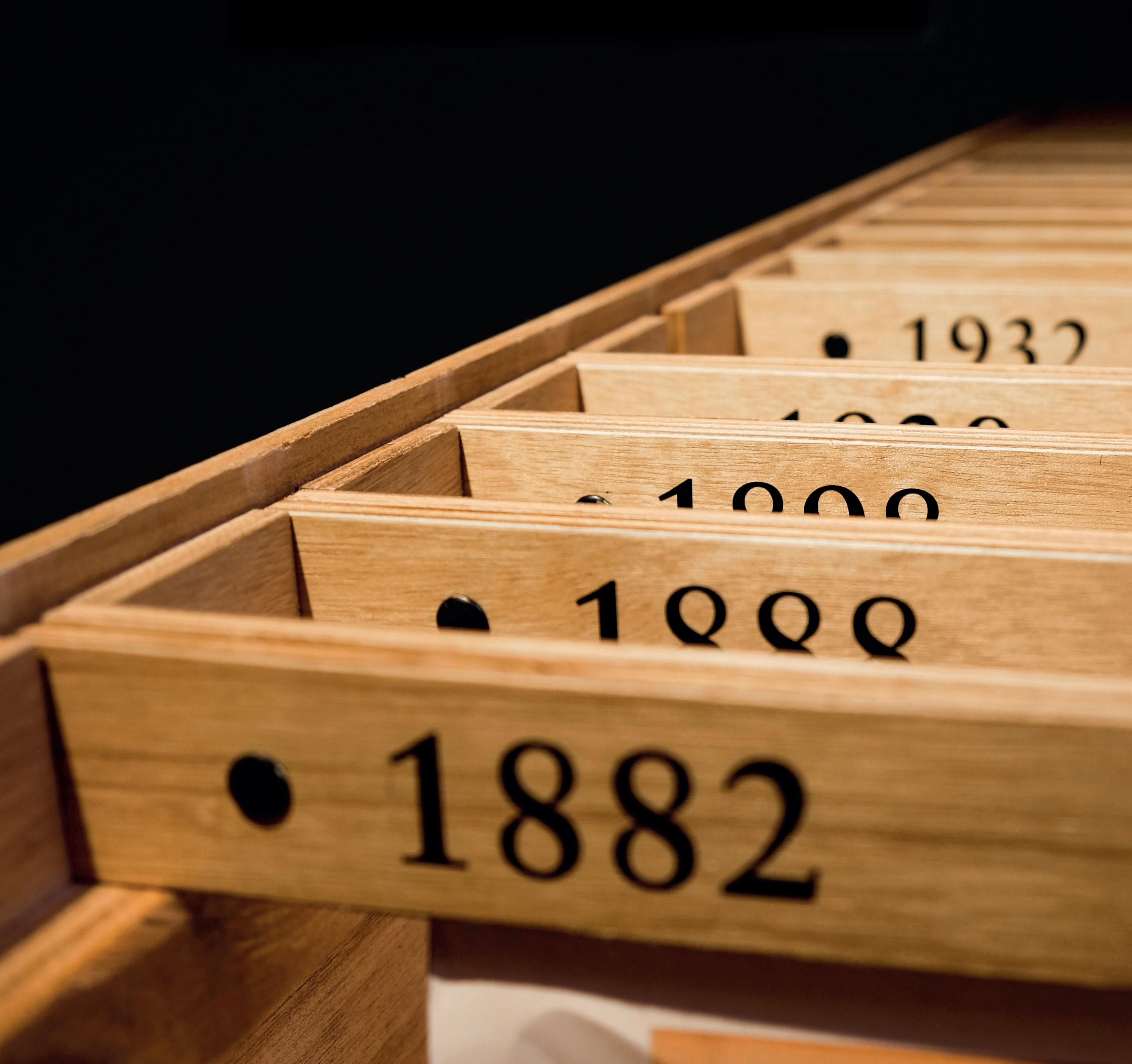
New historical evidence on Muhammadi Begum prophecy
Hadith-e-Rasul – Sayings of the Holy Prophet Muhammadsa
It is narrated by Ibn Abi Mulaika, “Two women were stitching shoes in a house – or in a chamber. Then one of them came out with an awl pierced into her hand and accused the other. The case was brought to Ibn Abbasra, who said:
“‘Allah’s Messengersa said, ‘If people were to be given [merely] based on their claims, the life and property of the people would be lost.’ Remind her [i.e., the defendant] by invoking Allah and recite to her:
Page 6
Page 14 Page 10
��ﺗأ��ا نأ ﺔﻜﻴﻠﻣ ��أ ﻦﺑا ﻦﻋ ةﺮﺠ��ا �� وأ ـ ﺖﻴﺑ �� نازﺮ�� ﺎﺘﻧﺎ� �� ﻰﻔﺷﺈﺑ ﺬﻔﻧأ ﺪﻗو ﺎﻤﻫاﺪﺣإ ﺖﺟﺮ�� ﻰﻟإ �ﻓﺮﻓ ،ىﺮﺧ��ا ﻰﻠ� ﺖﻋدﺎﻓ ،ﺎﻬﻔﻛ لﺎﻗ سﺎﺒﻋ ﻦﺑا لﺎﻘﻓ ،سﺎﺒﻋ ﻦﺑا ﻮﻟ :ﻢﻠﺳو ﻪﻴﻠ� ���ا ﻰﻠﺻ ���ا لﻮﺳر ءﺎﻣد ﺐﻫﺬﻟ ��اﻮﻋﺪﺑ سﺎﻨﻟا ﻰﻄﻌﻳ اوءﺮﻗاو ���ﺎﺑ ﺎﻫوﺮ�ذ ��ﻟاﻮﻣأو مﻮﻗ ﺪﻬﻌﺑ نو��ﺸ� ﻦﻳﺬﻟا نا} ﺎﻬﻴﻠ� ﻦﺑا لﺎﻘﻓ ،ﺖﻓ��ﻋﺎﻓ ﺎﻫوﺮ�ﺬﻓ .{���ا ﻪﻴﻠ� ���ا ﻰﻠﺻ ��ﻨﻟا لﺎﻗ سﺎﺒﻋ .ﻪﻴﻠ� ﻰﻋﺪﻤﻟا ﻰﻠ� ��ﻤﻴﻟا:ﻢﻠﺳو
is
Oath
upon the accused
���ا ﺪﻬﻌﺑ نو��ﺸ� ﻦﻳﺬﻟا نا Continued on next page >>
While discussing the Promised Messiah’sas prophecy regarding Ahmad Beg (more commonly known as the Muhammadi Begum prophecy), opponents ask what
evidence is there that the direct addressees – some family members of the Promised Messiahas – had actually turned against Islam. We present below the background of
Continued on next page >> Henry &
Unsplash
the prophecy along with never-before-seen evidence.
Co.|
<< Continued from previous page
“‘[‘(As for) those who take a paltry price in exchange for (their) covenant with Allah…’ (Surah Al-e‘Imran, 3:78)]’
“So they reminded her and she confessed. Ibn Abbasra then said, ‘The Prophetsa said, ‘The oath is to be taken by the defendant [in the absence of any proof against them]’.”
(Sahih
Hazrat Mirza Ghulam Ahmadas, In His Own Words
Perils of arrogance
<< Continued from previous page
While some of the prophecies of Hazrat Mirza Ghulam Ahmadas of Qadian were aimed at proving Islam’s supremacy to people of other faiths, like Christians and Hindus, a particular prophecy was aimed at Muslims who had turned against Islam so much so that they facilitated Hindus and Christians in deforming the teachings of Islam and propagating blasphemous rumours about the Holy Founder of Islam, Hazrat Muhammadsa
This group of Muslims – the primary target of this prophetic warning – belonged to the greater family of the Promised Messiahas. They were Huzoor’sas first cousins, namely Mirza Imam-ud-Din and Mirza Nizam-ud-Din (alt. spellings Imamdin, Nizamdin) who are more commonly known for persecuting the Promised Messiahas for his religious claims. But the fact of the matter is that they had turned against Islam altogether; hurling abuse at the Holy Prophetsa, desecrating the Holy Quran, and mocking the existence of God had become matters of routine.

Before we delve deeper into this prophecy – the prophecy regarding Ahmad Beg and his daughter Muhammadi Begum – it is important to note that the Promised Messiahas tried to keep this domestic matter private (for being related to family) and not publicise it. He warned these relatives on many occasions – verbally and in writing –but the first to make the affair a public one were those whom he addressed.

This prophecy unfolded through a series of events and then accumulated into its final phase – the one now commonly known as the prophecy of Muhammadi Begum. The series of these prophetic warnings span a period of seven years (1885-1892) from one angle and over a period of twenty-three years from another (1885-1908).
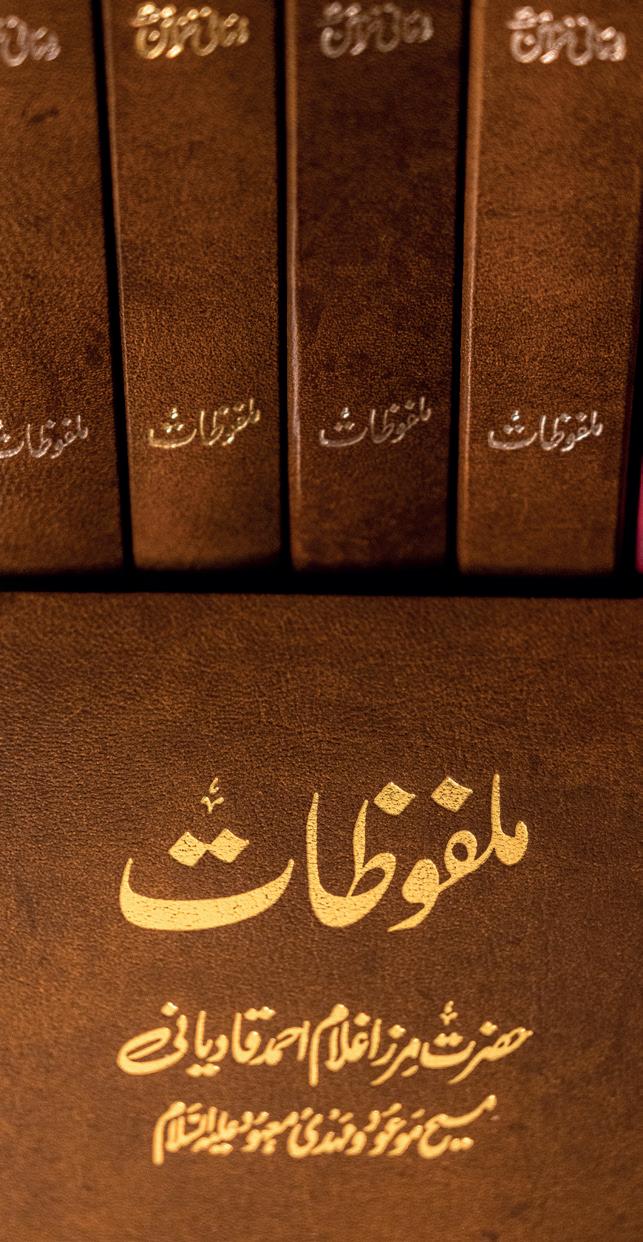
of Hinduism, Sikhism, and Islam – into a most distorted form of all three. (For details on the Lal Begi faith, see The Genealogies of Lal Beg, in The Legends of the Panjab by Captain RC Temple)


Some sections of this sect would have one of the three faiths dominate the teachings, and it would be taken to fall under that religion, although it always remained Hindu in essence.
Mirza Imam-ud-Din had become a patron-leader of this sect of Hindus, and, as recently found document facts suggest, he was himself a follower of this faith. I present below a never-before-seen book written by Mirza Imam-ud-Din which is sufficient proof of how he was distorting Islam by mixing it with the Balmiki faith.
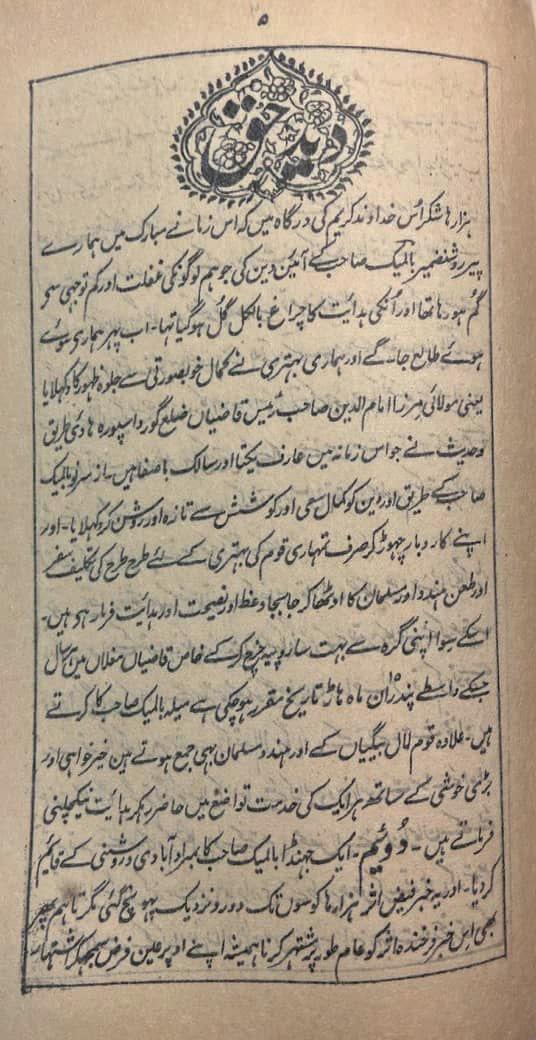
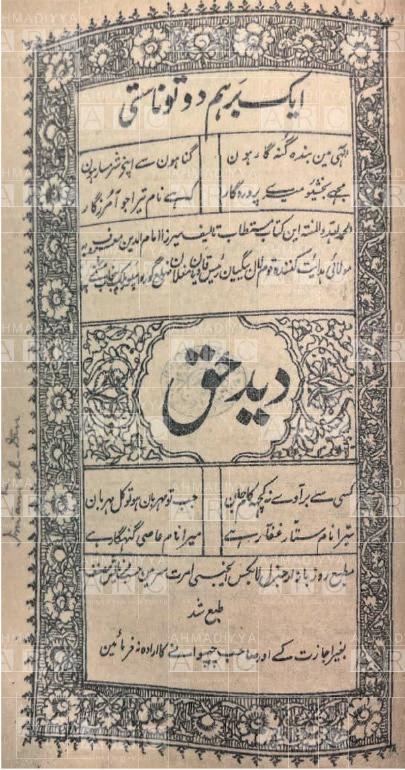
The book is called Deed-e-Haq (Sighting of God) and explains to the Lal Begis in detail what they are supposed to believe and practice. His name appears as “talif Mirza Imam-ud-Din, ma’ruf ba maula-e-hidayat kuninda qaum Lal began” (written by Mirza Imam-ud-Din, known as the guiding lord of the Lal Begi people).
The foreword, the author of which is not mentioned at the end, appears to be written by a Lal Begi, and reads:









































































































“Thousands of thanks to God, that as the religious teachings of our insightful pir Balmik Sahib were becoming distinct through the neglect of his people, he has ignited this lamp through a very pious person, Mirza Imam-ud-Din of Qadian, district Gurdaspur, who has rejuvenated the teachings of Balmik Sahib. […]” (Deed-eHaq, p. 5)
The Lal Begi beneficiary of Mirza Imamud-Din goes on to sing praises of how the latter has done what he could to establish the Balmik faith; how much he has spent, how much care and compassion he has shown, and how he has written the book purely to
revive the Balmiki faith.
One of the future projects mentioned is Imam-ud-Din’s desire to build a Balmik shrine for his followers, i.e., the Lal Begis, in Qadian.





The contents of the book, in the words of Imam-ud-Din, go on to explain the dos and don’ts for Lal Begis, with a clear instruction:
“O Lal Begis! Do not go towards any other religion and stick strictly on the path of Pir Balmik. […]” (Ibid., p. 7)
“My desire is that you stay on your path and do not seek to follow any other religion. […]” (Ibid., p. 9)
“There is no special god in mosques who is their friend and your enemy. You should build your own temple to remember god. […]”
Imam-ud-Din goes on to remind them of their prayers and gives advice on new ways of praying where everyone stands facing each other and says special mantras, which Imam-ud-Din spells out for them; before telling them that “you ought to take these instructions as god’s words […]” (Ibid., p. 18).
















Another never-before-seen evidence of this family’s transgression is Imam-udDin’s book titled Gul-e-Shaguft (Blossoming Flower).







The title page has on it, boldly written all across, the words:




















Balmik kafi, Balmik shafi, Balmik ma’fi (Balmik is sufficient, Balmik cures, Balmik forgives)

This is clearly what the Promised Messiahas meant when he mentioned, with much heartfelt pain, that this family had turned away from and turned against God altogether.
As specimen, I present only a few statements from this book:
“Jesus is the only son of God and Muhammad is only a friend.” (Gul-e-

“Arrogance is an exceedingly perilous affliction; its emergence within a person signifies spiritual demise. I am thoroughly convinced that this malady surpasses even murder in its gravity. An arrogant individual essentially becomes a sibling of Satan, for it was arrogance that led to Satan’s humiliation and disgrace. Therefore, it is imperative for a believer not to harbour arrogance but to embody humility, meekness, and deference. These virtues are particularly pronounced in those divinely commissioned; they exhibit a degree of humility and submission unparalleled, most exemplified in the Holy Prophetsa. When one of his servants was enquired about his experience of serving him, the servant responded: ‘The unvarnished truth is that He serves me more than I serve him.’
Mirza Imam-ud-Din Beg, the first cousin of the Promised Messiahas, had had a change of heart and had turned away from Islam. This became manifest when he became the leader of a Hindu caste-faith known as Lal Begis. This caste was seen as among the lowest class of Hindus and worked as sanitary labour, more commonly known as Chuhras
Not only was this class seen as the lowest stratum of the Hindu class system, but they were not even included in the four-fold varna of Hindu castes – where the fourth one is that of the untouchables. This class, for its profession and genealogy, was seen as outside of the four varnas and as a fifth varna. Hence, despite being Hindus in faith, they were not taken as belonging to the Hindus.
This led them to create a heretical sect where they venerated leaders from within their own class, with Lal Beg being their venerated saint. They had gotten to be known as Lal Begis and traced their teachings to Valmiki (alt. Balmiki) – the original poet of the Ramayana. However, their teachings transpired into a combination
Friday 22 September 2023 | AL HAKAM 2
Photo courtesy of Suhaib Ahmad
al-Bukhari, Kitab at-Tafsir, Bab inna lazina yashtarun…)
( ِلآ ��� َو ٍ���� ��� ّ�� ّ�ُ�ّ��ا �ِّ�س َو کِرا� َو ٍ����)” (Al Hakam, 10 November 1905, Malfuzat [1988], Vol. 4, pp. 437-438)
Title page of Deed-e-Haq by Imam-ud-Din, self-styled as Maula-e-Hidayat (lord of the guidance)
Foreword to Deed-e-Haq by a Lal Begi follower of Imam-ud-Din, praising his efforts for the Balmiki faith
Shaguft, p. 8)
“Muslim God is in human form; let’s praise the God of Balmik.” (Ibid, p. 12)

The print-line of the book does not state the year of print, but a statement within locates this book in 1899, where he states:


























































































“It has been 1899 years that Jesus existed…” (Ibid, p. 6)

Also, a reference to the Ahmad Beg prophecy is made but only mentions that Muhammadi Begum’s husband would die in three years, but this hadn’t happened and Muhammadi Begum is happily married and has mothered Sultan Muhammad’s children.


Quite slyly, he leaves out the fact that Muhammadi Begum’s father was meant to die in three years after the marriage, which he did.
Howsoever sad this falsehood may be, it goes to show where opponents of the Jamaat got this attitude from – from the guru of Lal Begis.
This is how this line of the Promised Messiahas had derailed their faith into obscurity and absurdity. The family, spearheaded by Imam-ud-Din had no respect left for the Holy Prophetsa and the holy teachings of Islam. And it was this state of affairs that led the Promised Messiahas, acting on divine instruction, to issue them a prophetic warning. He says about Imamud-Din and Nizam-ud-Din:
“God Almighty saw my paternal cousins (chacha-zad bhai) and other close relatives that they are indulged in soul-crushing activities; drowned in ill innovations, and false beliefs […]. They deny the existence of Allah the Almighty and are always after creating mischief. […]” (Aina-e-Kamalat-eIslam, Ruhani Khazain, Vol. 5, p. 288)
“They would ridicule the words of Allah
and his Messenger; even saying that the Quran is nothing but meaningless words. […]” (Ibid., p. 568)
In August 1885, these cousins of the Promised Messiahas published a tract wherein they demanded a sign, and said that they wouldn’t take anything as a sign unless it appears within their family. The Promised Messiahas prayed fervently to Allah the Almighty and received the following revelation:










“I [God Almighty] have seen their transgression and rebellion, so I will afflict various calamities upon them and will destroy them … and demolish them; you shall see what I shall do to them. I have power over everything. Their women will turn into widows and their children into orphans; their houses will become barren, so they can taste what they asked for. But I shall not kill them all at once, but gradually so that they can repent and turn to God […]. All of them are accursed, save those who perform good deeds and severed their ties with them and avoided their company. […]” (Ibid., pp. 569-570)
The addressees of this divine warning paid no heed and continued in their mischief and transgression.


In the same month of this blasphemous tract being published, i.e., August 1885, the Promised Messiahas received a revelation from Allah, which he mentions as such:
“I received a revelation regarding Imam-ud-Din and Nizam-ud-Din that within a period of thirty-one months, a severe calamity would strike them; that someone from their family would die, leaving them in intense shock and trauma. This will happen from today’s date, which is […] 5 August 1885. And just as had been foretold, in the thirty-first month after this revelation, Nizam-ud-Din’s daughter passed away at a young age, leaving behind a newborn child.”



(Tadhkirah, p. 103)

Similarly, the Promised Messiahas had recorded another vision in 1886 where he saw the sister of Nizam Din and Imam Din, who was the mother of Muhammadi Begum, in distress and agony. In the vision, the Promised Messiahas said to her: “Repent, repent! Or calamity shall befall your daughter or your granddaughter.”
(Tadhkirah, revelation of 1886, pp. 107-108)







By this time, Muhammadi Begum was nowhere in the picture.
Around the same time, Nizam-ud-Din and Imam-ud-Din responded by approaching enemies of not only the Promised
Messiahas, but enemies of Islam. They approached Pundit Lekhram, who was notorious all over India for the shameless, foul-mouthed opposition to the Prophetsa of Islam and the Holy Quran. They urged him to challenge the Promised Messiahas by asking for a sign from God, which he did.
(Tarikh-e-Ahmadiyyat, Vol. 1, p. 317)



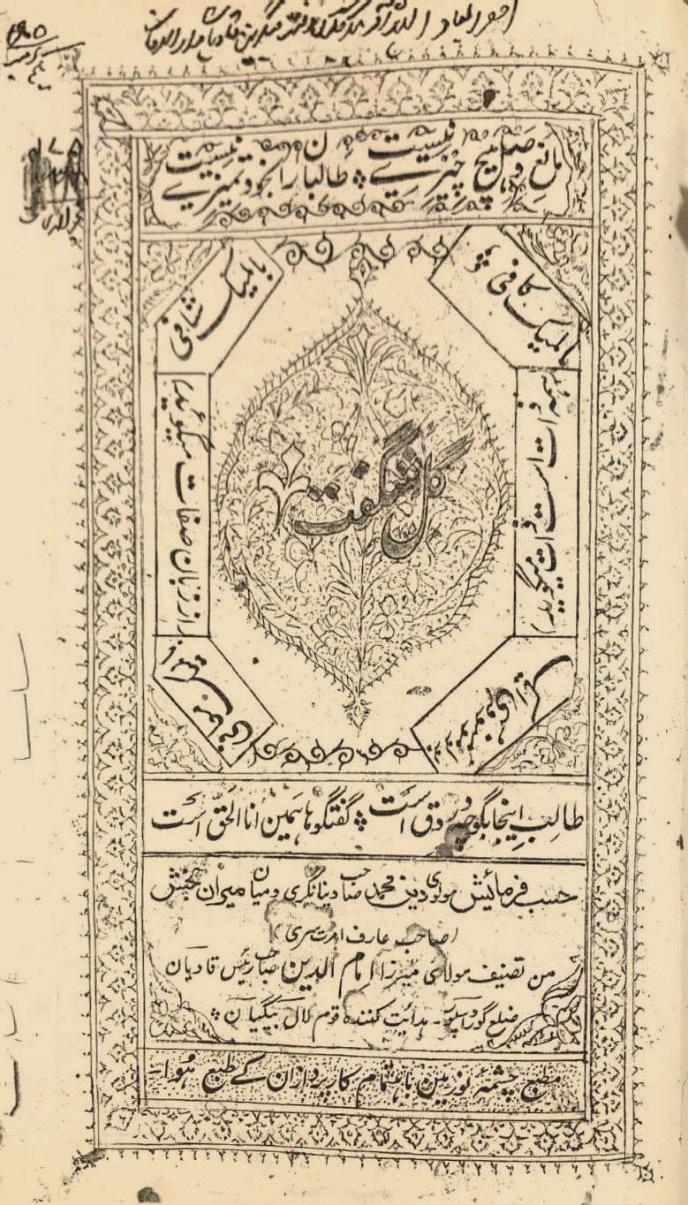
This collaboration with the notorious Islamophobic Lekhram is evident from the tract written by Mirza Imam-ud-Din, published under the auspices of Lekhram, and later included in his book Takzib Barahin-e-Ahmadiyya, as part of a special appendix titled Zamima Kitab Haza Babat Khatut-o-Ishtiharat (Appendix on Letters and Tracts):
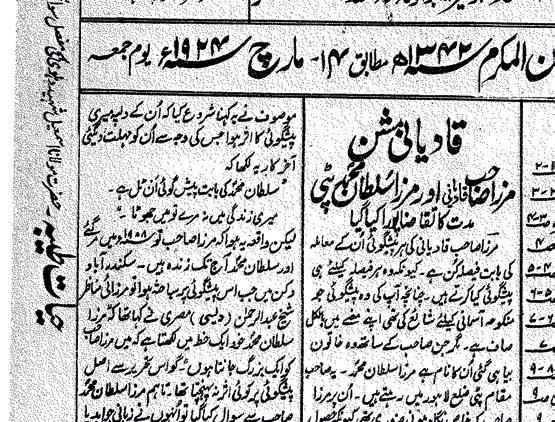
It is signed by “Mirza Imam-ud-Din, Chief of Qadian, brother of Mirza Ghulam Ahmatd, baqalam khud [autograph]” and dated 13 August 1885.
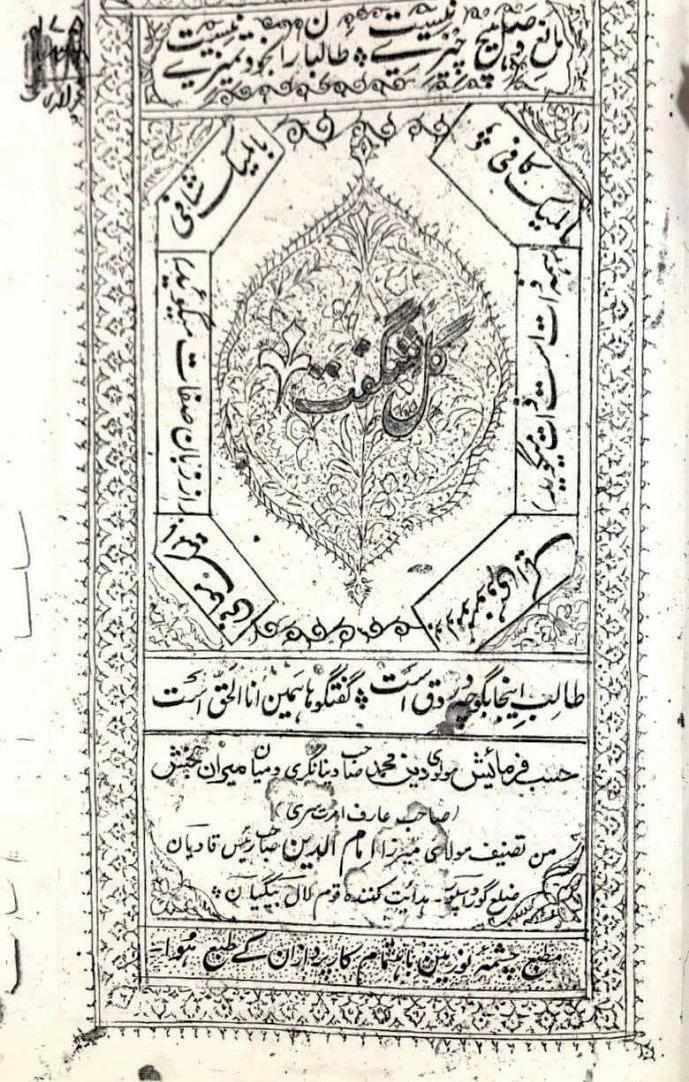
The contents of the tract invites everyone, Muslim, Hindu, or Christian, to urge the Promised Messiahas to produce any sign, and guides them on how to reject any sign by setting the criteria of fulfilment at a ridiculous and unrealistic threshold.
What we see here is how these socalled Muslim relatives of Hazrat Mirza Sahibas approached anti-Islam Hindus and joined hands against Islam. They went on to print and publicise a tract against Islam, the Prophetsa of Islam and the teachings of Islam. It became evident that their thoughts were deeply inspired by Hindu anti-Islamic propaganda, as we have seen in Imam-udDin’s book quoted above. They mocked the marriage of a girl to her mother’s cousin as being a marriage between a real niece and a real uncle, and presented as an example the Holy Prophet’ssa marriage to Hazrat Zainabra. This is an important point about the Holy Prophet’ssa marriage that must be kept in mind.

Now, where, when, and why does Muhammadi Begum come into the picture?



Muhammadi Begum comes into the picture
In 1888, Mirza Ahmad Beg approached the Promised Messiahas requesting that he sign a legal document so that a certain piece of land could be transferred to them. Upon this, the Promised Messiahas asked to be given some time to pray, as he did before in important matters. It must be noted that this Ahmad
Beg was the father of Muhammadi Begum and husband of the sister of Imam-ud-Din and Nizam-ud-Din – the woman who had appeared in the Promised Messiah’sas dream in a state of anguish and distress and was warned about a calamity that was waiting to strike her family.




The Promised Messiahas got back to them the following day and told them that Allah had instructed him to ask for the hand of Ahmad Beg’s daughter, Muhammadi Begum. This reminds us of how the Holy Prophetsa had won the hearts of clans and tribes after he married their women like Jaweria, Umm Habiba, and Safiya, and also how the hearts of enemies like Abu Sufyan and the chief of a Jewish tribe, Huyayy ibn Akhtab, softened for Islam after marrying their daughters to the Holy Prophetsa. So the Promised Messiahas, walking in the footsteps of his Holy Master, did the same, and that too on divine instruction.
Ahmad Beg immediately turned down the proposal, upon which he was warned by the Promised Messiahas that should he marry his daughter Muhammadi Begum elsewhere, he would be struck by death within three years of marrying her; and whoever she is married to would die within two and a half years. (Eik Peshgoi Pesh az Waqu ka Ishtihar [Announcement of a Prophecy before its Manifestation], Majmu‘ah-e-Ishtiharat, Vol. 1, p. 136)
Ahmad Beg, on this occasion, went to none else but the anti-Islam Christian newspaper Nur Afshan and had this private correspondence about his daughter published. (Aina-e-Kamalat-e-Islam, Ruhani Khazain, Vol. 5, pp. 287-288)

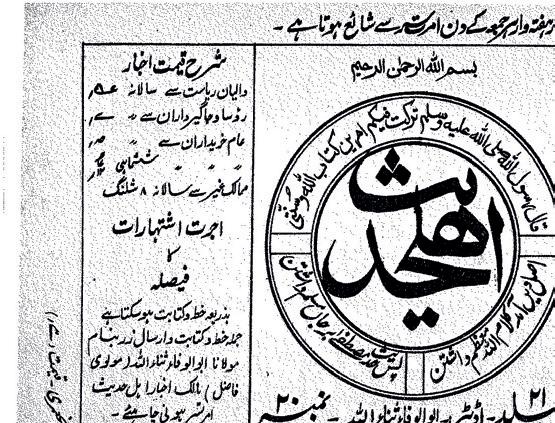
The tabloid got fuel for its rusty engine and published all sorts of gossip and mockery about this proposal of the Promised Messiahas to marry the daughter of a distant cousin. I must remind the readers of the case of Hazrat Zainab’sra marriage to the Holy Prophetsa
The Promised Messiahas clarifies the background of this prophecy in Aina-eKamat-e-Islam:
“The base of this prophecy was not to randomly ask for the hand of Mirza Ahmad Beg’s daughter, but to show a sign to my close relatives who had turned against Islam, and one of them had progressed so much in mischief as to openly hurl abuse at Allah the

3 AL HAKAM | Friday 22 September 2023
Continued on next page >> Title page
of
Gul-e-Shaguft (Blossoming Flower) the Balmiki faith
Imam-ud-Din’s tract, reproduced in Arya Musafir, being the complete works of Pundit Lekhram, in Takzib Barahin Ahmadiyya, pp. 414-415
This Week in History
A glimpse into the rich history of the Ahmadiyya Muslim Jamaat
22 September
22 September 1895: The Promised Messiahas endeavoured his utmost to revamp the style and class of religious debates being conducted in the Indian subcontinent. On this day, he drafted a meticulous announcement on the abovementioned topic. This was printed by Zia-ul-Islam Press in Qadian, carrying the supporting signatures of hundreds of honourable Muslim persons of influence. (Majmu‘ah-eIshtiharat [2019], Vol. 2, pp. 17-40)

22 September 1946: On this day, Hazrat Musleh-eMaudra embarked on a journey to Delhi, where he granted audiences to prominent Indian leaders, including Jinnah and Gandhi. Huzoorra also wrote to the then Viceroy of India, giving him valuable guidance in regard to the ongoing political and religious conflict within the country.
For more details, see “The deadlock over Interim Government and Constituent Assembly for India: Its background and Hazrat Mirza Bashiruddin Mahmud
Ahmad’s guidance”, Al Hakam, 15 July 2022, Issue 226, pp. 17-20.
23 - 24 September
23 September 1924: On this day, Hazrat Sir Chaudhry Zafrulla Khanra read out the article written by Hazrat Musleh-eMaudra at The Conference on Some Living Religions within the British Empire. Remembering this day, Hazrat Sir Chaudhry Zafrulla Khanra writes:
“When the time came to read the address, the Imam leaned towards me to say in a most affectionate manner, ‘Do not worry, I will continue to pray for you.’ Every seat in the hall was taken. A large number had to stand. The entire address was heard in silence.” (Tehdis-eNemat, pp. 212-213)
24 September 1973: On this day, Hazrat Khalifatul Masih IIIrh returned from his visit of Europe. Sahibzada Mirza Mansoor Ahmad (father of Hazrat Khalifatul Masih Vaa) who served as Nazir-e-Ala and Amir-eMuqami in Rabwah, Chaudhry
Ahmed Mukhtar Sahib Amir of Karachi Jamaat, Major Shamim Ahmed Sahib, Sultan Mahmood Anwar Sahib who served as a missionary of Karachi, and Chaudhry Zahoor Ahmad Sahib, arrived at the airport to welcome Huzoorrh
As soon as Huzoorrh arrived, Sahibzada Mirza Mansoor Ahmad stepped forward and had the honour of meeting and embracing Huzoorrh. After that, the others welcomed Huzoorrh. (Tarikh-e-Ahmadiyyat, Vol. 29, pp. 199-201)
24 September 2014: On this day, Hazrat Khalifatul Masih Vaa visited the National Parliament of Ireland, the Oireachtas, at Leinster House in Dublin. More than 20 parliamentarians welcomed Huzooraa to Ireland. Following his meeting with the parliamentarians, Huzooraa was escorted to the galleries of both the Lower and the Upper Houses of Parliament, where he observed the parliamentary proceedings.
(“Head of Ahmadiyya Muslim Community Visits Irish National Parliament”, www. pressahmadiyya.com)
25 September
25 September 1927: On this day, during his visit to Shimla, Hazrat Musleh-e-Maudra granted an audience to the aggrieved local Muslims, at Kingsley, Shimla. This joint session of Ahmadi and non-Ahmadi Muslims was held to establish the Jami‘at-ul-Ikhwan, the idea of which was proposed by Huzoorra himself during his lecture on 11 September. Huzoorra delivered a short address during this session as well.
For more details, see “Communal harmony, Unity Conference, and Muslim rights: Hazrat Musleh-eMaud’s 1927 visit to Shimla”, Al Hakam, 24 February 2023, Issue 258, pp. 13-16.
25 September 1983: On this day, Hazrat Khalifatul Masih IVrh laid the foundation of the Rizwan Mosque in Fiji. (Silsila Ahmadiyya, Part 4, p. 826)
26 September
26 September 1924: On this day, Hazrat Musleh-eMaudra delivered an address at the Dutch Hall in London. The lecture was delivered at the request of the Conservative Party, entitled Hindustan ke Halaat-eHaazira aur Ittihad Peda Karne ke Zarai – The Current Situation in India and Means of Establishing Unity. (Tarikh-e-Ahmadiyyat, Vol. 4, p. 454)
26 September 2013: On this day, Hazrat Khalifatul Masih Vaa delivered the keynote address at a reception held in his honour at the Oriental Mandarin Hotel in Singapore. The event was attended by more than 100 non-Ahmadi dignitaries and guests, including Mr Lee Koon Choy, a founding member of the ruling People’s Action Party. During his keynote address, Huzooraa explained the basis for a just economy, the need for equity between nations, the reasons behind the misrepresentation of Islam, and his concerns about the increasing risk of a Third World
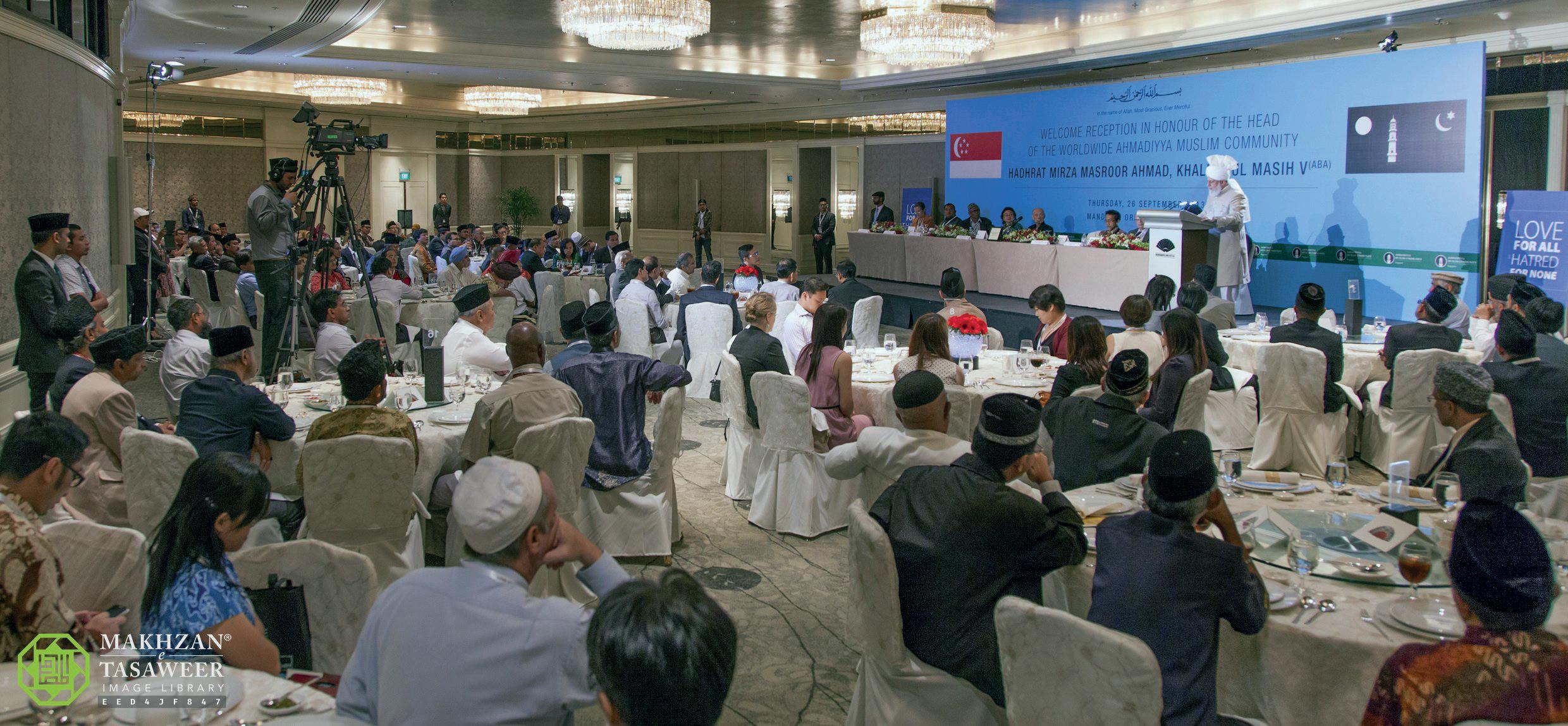
Friday 22 September 2023 | AL HAKAM 4
Hazrat Khalifatul Masih Vaa delivering the keynote address at a reception held in Singapore
War. (“Head of Ahmadiyya Muslim Community delivers Historic Address in Singapore”, www.pressahmadiyya. com)
27 September
27 September 1937: On this day, Hazrat Musleh-e-Maudra laid the foundation stone of a guest house in Qadian, which began to serve guests after it was completed the following year. (Tarikh-e-Ahmadiyyat, Vol. 7, p. 352)
27 September 2013: During his Friday Sermon on this day, delivered from the Taha Mosque in Singapore, Hazrat Khalifatul Masih Vaa said that he was thankful to Allah the Almighty that He once again enabled him to meet with the Ahmadis there. Huzooraa said that it was difficult for him to visit Malaysia and Indonesia due to the persecution of Ahmadis. Therefore, Singapore was a place where he could meet with the Indonesian and Malaysian Ahmadis.
28 September
28 September 1905: On this day, the Promised Messiahas received two guests; one from Turkey and a Jewish individual. He was asked some questions in Arabic, and he too gave the answers in Arabic. The editor of Al Hakam, Hazrat Sheikh Yaqub Ali Irfanira reproduced this interesting conversation in the newspaper in Urdu. During this detailed discussion, Hazrat Ahmadas removed many misunderstandings. (Malfuzat [1988], Vol. 4, pp. 446-451)
28 September 2013: On this day, Hazrat Khalifatul Masih Vaa held an audience with more than 20 Indonesian guests representing various media outlets, educational institutions, and think tanks at the Taha Mosque in Singapore. During the 70-minute question and answer session, Huzooraa explained the true teachings of Islam and clarified various misconceptions concerning the Ahmadiyya Muslim Jamaat. (“True Khilafat compatible with Democracy –Head of Ahmadiyya Muslim Jamaat”, www.pressahmadiyya.com)
Almighty and the Messenger of Allah […] even mocking the Islamic modes of worship […].” (Ibid., pp. 320-321)
But these ill-fated family members of Hazrat Mirza Sahibas collaborated with Hindus and joined hands with Christian missionaries whose bread and butter lay in mockery of Islam and its holy founder. This formed a block of anti-Islam Hindus, antiMuslim Christians, and faithless Muslims acting against Islam in the garb of Islam.
Now, before moving on, let us go back to the words of the prophecy that was made well before Muhammadi Begum was in the picture, and is presented above.
Allah had said: “But I shall not kill them all at once, but gradually so that they can repent and turn to God […]. All of them are accursed, save those who perform good deeds and severed their ties with them and avoided their company […].”
So the prophecy remains, very Islamically so, one of wa‘eed and is, hence, inherently subject to be reversed through repentance; and this had been the whole basis from the start.
However, Ahmad Beg married his daughter, Muhammadi Begum, to Mirza Sultan Muhammad Beg in April 1892 and, as he had been warned, died in September of the same year – just five months after marrying away his daughter. This is very straightforward and requires no comments. The first part of the prophecy was fulfilled.
This cast a very dark shadow of fear on the hearts of the family, and although they did not accept the Promised Messiahas, he was approached by them, requesting to somehow take away the prophesied catastrophe from their family. He reminded them that the only way was to repent and refrain from blasphemy towards Islam and its holy founder. (Haqiqatul Wahi, Ruhani Khazain, Vol. 22, p. 195; Zamima Anjam-eAtham, Ruhani Khazain, Vol. 11, p. 337)
While we do not have copies of such correspondence or any other documentary evidence, the fact that the Promised Messiahas continuously published their requests and that no one came forward to deny the correspondence, it can be seen as ample proof of the fear that had struck the family.
After a period of two and a half years, opponents started questioning the Promised Messiahas as to why Sultan Muhammad had not passed away. The Promised Messiahas would reply that the death of Ahmad Beg had shook the whole family to the core, including Sultan Muhammad, the husband of Muhammadi Begum and the family refrained from any mockery against Islam and its Holy Founder, Prophet Muhammadsa
I have gone through newspapers from those years and have been unable to find any statement published by Sultan Muhammad, denying the bold and very clear-cut claim of Hazrat Mirza Sahibas that fear had struck the family and that they had hence refrained from their un- and anti-Islamic practices.
The most important aspect to remember is that the words of the prophecy stated that if Muhammadi Begum is married elsewhere, then her husband shall die and, and as a widow, she will enter the nikah of the Promised Messiahas. So she had to be widowed before her marriage to the Promised Messiahas
The fear that held Sultan Muhammad from being blasphemous against Islam, and never denying that he was struck with the fear of Allah, kept him from becoming a target of the prophecy, making him a beneficiary of the exception clause of the prophecy. He outlived the Promised Messiahas, and so did Muhammadi Begum.
The Promised Messiahas, in the latter part of his life (1906), wrote in his book, Haqiqatul Wahi that his marriage to Muhammadi Begum, which was settled in the Heavens, had either been nullified (faskh-e-nikah) or postponed. (Tatimah Haqiqatul Wahi, Ruhani Khazain, Vol. 22, p. 570)
Hence, the bitter opponents of Islam, and their Hindu and Christian accomplices, were able to see both aspects of the prophecy: the death of Mirza Ahmad Beg and the repentance of Sultan Muhammad.
The Ahmadiyya publication Tasheez al-Azhan, in its issue dated 5 May 1913 published a letter written by Sultan Muhammad stating that he believed that the prophecy was fulfilled and that he had developed the fear of God in his heart. The letter read:
“Assalamo alaikum. I am in receipt of your letter. I am thankful for reaching out.

“I have seen, and still see, the late Mirza Ji as a pious, saintly, noble, and God-fearing person. I hold nothing against his followers; rather, I regret that a few issues prevented me from reaching out to him in his lifetime.
“Sincerely
“Sultan Muhammad.”
A whole decade later, Sanaullah Amritsari, in his periodical Ahle Hadith (14 March 1924), published statements attributed to Sultan Muhammad denying any fear or repentance, and professing that he had remained unaffected by the Promised
Messiah’sas prophecy.
However, the Ahmadiyya publication had published his handwritten letter in 1913, which he never denied. His denial in the non-Ahmadi newspapers mentioned above was not accompanied by any handwritten note.
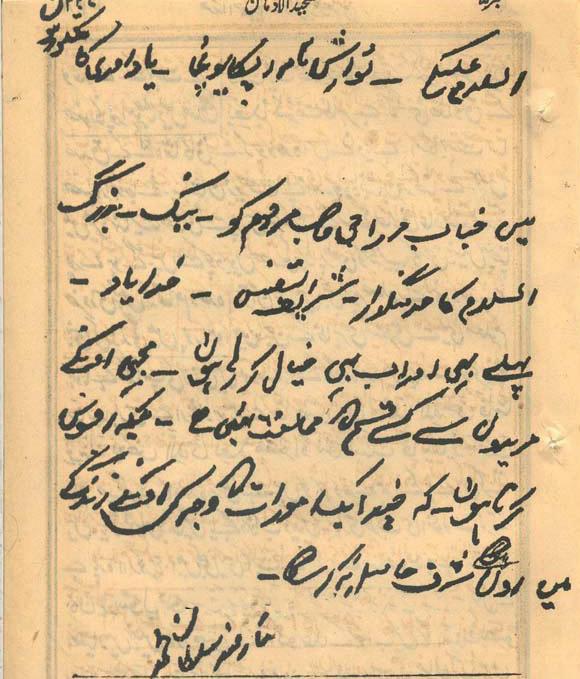
But for argument’s sake, if the benefit of the doubt is given to the non-Ahmadi publications, and it is taken that he had his denial published a decade later, the fact still stands undeniable that during the lifetime of the Promised Messiahas, he published no denial whatsoever.
So, we close by reminding the readers that Sultan Muhammad never indulged in the anti-Islamic activities of his in-laws. He never became a target of the prophecy and was saved by the exception clause of the same prophecy. Hence Muhammadi Begum never became widowed, and, hence, never entered the nikah of the Promised Messiahas. (Ishtihar Nusrat-e-Din wa Qata’ az Aqarib Mukhalif-e-Din [Announcement regarding help for the faith and severing ties with close relatives who oppose the Faith], in Majmua-e-Ishtiharat, Vol. 1, p. 237, reprint 2019; Aina-e-Kamalat-e-Islam, Ruhani Khazain, Vol. 5, p. 325)
Should more facts and data become available, the author will continue to share them with the readers; just as they have been shared today in the form of Imam-ud-Din’s book on his strange religion, which attacked Islam in a very shameless manner.
In the meantime, we leave the readers to decide whether they want to side with the Lal Begis, or with the one who championed Islam and saved it from any attack from anyone and any side.
5 AL HAKAM | Friday 22 September 2023 22 -
28 September
<< Continued from previous page
(Asif M Basit, Ahmadiyya Archive & Research Centre)
Tasheez al-Azhan, 5 May 1913
75 years of Rabwah
A glimpse into its early years
Al
Hakam
75 years ago, on 20 September 1948, Hazrat Musleh-e-Maud, Mirza Bashir-ud-Din Mahmud Ahmadra formally inaugurated the town of Rabwah, which served as the new headquarters and residence of Khilafate-Ahmadiyya. Huzoorra moved from his temporary residence in Lahore to this new Markaz in Rabwah on 19 September 1949. Since then, Rabwah was blessed with the presence of Khilafat until April 1984, when Hazrat Khalifatul Masih IVrh had to migrate from Pakistan to England, due to Ordinance XX issued by General Zia-ul-Haq.
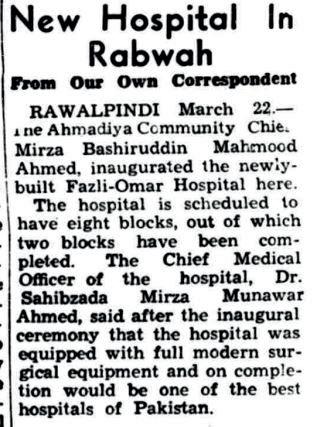
Going back to the establishment of Rabwah, it is worth mentioning that while the Jamaat had successfully acquired this piece of land, the opponents of Ahmadiyyat intensified their jealousy towards the Jamaat. A sudden wave of false propaganda was initiated by the opponent press, which was duly refuted by the Jamaat officials. One can realise the intensity of this propaganda by the fact that even the Government had to issue a detailed statement on this issue.
The Civil and Military Gazette reported:
“Chiniot Land Sold to Ahmadiyyas
“Reasons Explained by Government
“A report has appeared in a section of the Press criticising the sale by the West Punjab Government of 1,034 acres of land near Chiniot, Jhang District, to the Ahmadiyya community at Rs. 10 an acre. The main allegation is that before partition [of British
India] certain Muslim institutions were prepared to purchase the same land at Rs. 1,500 an acre. An objection has also been raised that, whereas the principle of Districtwise rehabilitation has generally not been accepted, Ahmadiyyas have been afforded facilities of settling down in a concentrated colony, says a Press note.
“This report is misleading and belies the facts. The land in question is barren and has proved uncultivable in the past. Before it was sold to Ahmadiyyas the Government advertised in the Press and invited objections from members of the public but no objection was received for [a] full one month.
“As regards the price, it can be categorically stated that the Government had never received the alleged offer of Rs. 1,500 an acre from any individual or institution. As there was no precedent for [the] sale of land for residential purposes to private bodies in this area, the price was fixed at the rate charged for land sold to Government Departments.
“Ahmadiyyas intend to build a new town in this area for the settlement of the urban population uprooted from Qadian. They contemplate starting schools, colleges, religious institutions and industrial concerns in the proposed town. These plans do not in any way conflict with the reasons which impelled the Government to reject the demand for District-wise rehabilitation of refugees who have settled down in large areas of the province.” (The Civil and
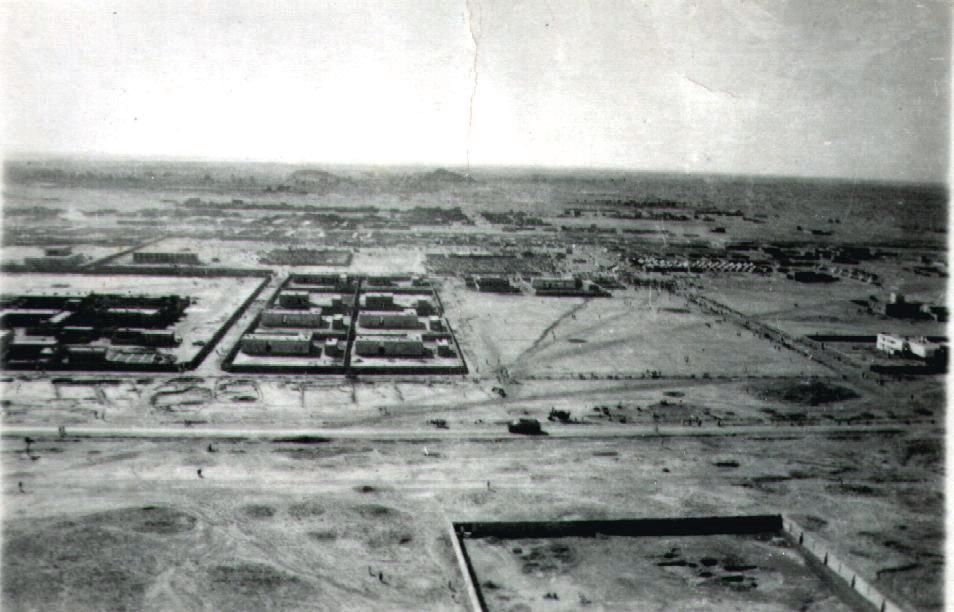
Military Gazette, 29 August 1948, p. 6)
In response, it was alleged that this clarification was “an afterthought invented to cover up this glaring example of favouritism to a particular sect.” (The Civil and Military Gazette, 9 September 1948, p. 2)
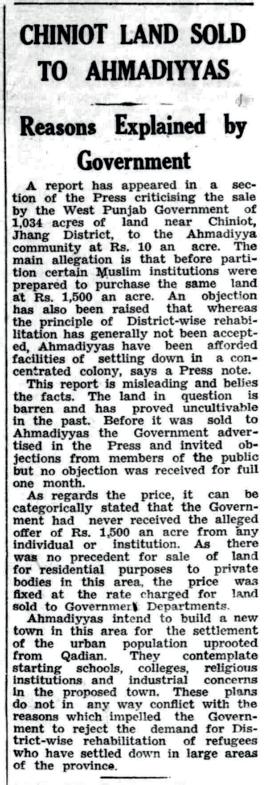
Inaugural address by Hazrat Musleh-e-Maudra
During his address at the formal inauguration of Rabwah on 20 September 1948, Hazrat Musleh-e-Maudra spoke in detail of the events during the partition of British India, the establishment of the new markaz, its future and responsibilities of its inhabitants. Huzoorra led the congregation in reciting the prayers of Hazrat Abrahamas and Hazrat Ishmaelas as mentioned in the Holy Quran, which they offered on rebuilding the walls of the Holy Ka‘bah in Mecca.
Huzoorra said:
“Currently, the world has forgotten the teachings of the Holy Prophet Muhammadsa
In fact, in addition to the others, even the Muslims themselves have abandoned his teachings. Today, the most blasphemedagainst person is Muhammadsa, the Messenger of Allah. Whether it is an author, philosopher, or historian, everyone attempts to disrespect the Holy Prophet Muhammadsa
The most benevolent person of this world is nowadays the world’s most blasphemedagainst person; the most honourable person of this world is considered to be the world’s most disrespected person.
Friday 22 September 2023 | AL HAKAM 6
Ata-ul-Haye Nasir
The Civil and Military Gazette | 29 August 1948 The Civil and Military Gazette | 23 March 1958
Rabwah in its early years | Image: Library
“If we have any jealousy for Islam or any love for the Holy Prophet Muhammadsa in our hearts, it is our duty to once again establish the majesty of the Holy Prophet Muhammadsa, even at the cost of sacrificing our own lives, or the lives of our wives and children. In fact, even if thousands of our coming generations are sacrificed, it will be a source of great honour for us. We had initiated this task in Qadian; however, in accordance with the Divine foretellings and Allah’s glad tidings, we had to migrate from Qadian. Now, under the same foretellings and prophecies, we are establishing a new town on this uncultivable land, with the aim of raising the name of Allah the Almighty. [...]
“Nowadays, the people’s hearts are [generally] vacant from the true love for the Holy Prophetsa, and they are unaware of the true insights of the Holy Quran. [...] They do have a desire to obey the Holy Quran, but their desire is to obey the incorrect interpretation that has been established in their hearts. Thus, Islam cannot become victorious in the world, until the victory of Ahmadiyyat. This point is so easy to understand that I wonder why the Muslims fail to comprehend, and why they do not contemplate that, despite their love for the Messengersa, they are facing humiliation in the world.”
Huzoorra further said that Ahmadi Muslims are in very small numbers compared to other Muslims, however, Ahmadis are serving Islam and preaching its peaceful message with far greater zeal:
“At this time, Ahmadi missionaries have spread in all corners of the world, and they are contesting with Christianity [through theological arguments], and this contest is not an ordinary one, but rather, various significant Christian powers have acknowledged that ‘their efforts are impactful’. Around 15 to 20 years ago, a very big conference of Christians was held in Lucknow, which was attended by some European Christian missionaries as well. In that, a question was raised as to what is the reason that no honourable and educated person now converts to Christianity in Northern India. All missionaries who were specialists in this matter, responded that since the claim of [Hazrat] Mirza Ghulam Ahmad Sahib[as] of Qadian, the progress of Christianity has ceased, for he has confronted Christianity so emphatically that wherever his literature reaches, Christianity is unable to progress. Then, a very significant committee was formed concerning Africa, by the Church of England, whose annual income is far greater than even that of many of our provinces. They spend about 400 to 500 million rupees on the propagation of Christianity. The report that was prepared by that committee, states that the progress of Christianity in Africa has ceased just because of Ahmadiyyat. [...]
“This is the acknowledgement from our opponents in regard to our preaching efforts. … Where did we get this strength from, and why did we have such a passion? The reason is that the Founder of the Ahmadiyya [Muslim] Community, the Promised Messiahas, inflamed such zeal, and we desire to once again make Islam victorious over the world. Hence, as long as the [non-Ahmadi] Muslims are opposing Ahmadiyyat, it will continue to create hurdles in the way of Islam’s victory, and as
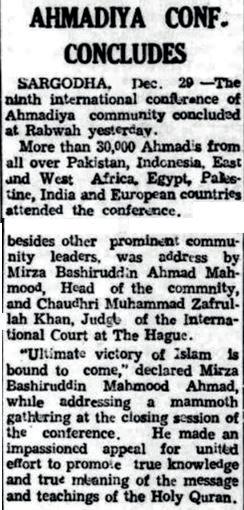
soon as they join the fold of Ahmadiyyat, the sooner will be the victory of Islam in the world. The reality is that among the various movements that are currently working in this world, all of them have certain worldly objectives, however, there is only one [purely] religious movement among the Muslims, and that is Ahmadiyyat. [...] In short, there is only one factor through which the Muslim world can unite once again and can ultimately become victorious over the whole world — that factor is Ahmadiyyat.”
(Tarikh-e-Ahmadiyyat, Vol. 11, pp. 433-436)
Advising Ahmadis to propagate the message of Ahmadiyyat to the Muslim world, Huzoorra said:
“You ought to advise the Muslims that their success and the progress of Islam and the whole world require them to accept Ahmadiyyat as soon as possible. What is the matter that halts them from inclining towards us? The whole of our history testifies that we have served the Muslims at every juncture, though we have always faced opposition from them in return. But still, we remained unharmed. [...] The reality is that the world left no stone unturned in opposing us and still continuing to do so, however, it is an established fact that Ahmadiyyat will surely become victorious in the world. [...] Allah the Almighty has associated the progress of Islam with Ahmadiyyat. The one who objects to Ahmadiyyat, in fact, objects to Islam. The one who desires to ruin Ahmadiyyat, in reality, wishes to ruin Islam. Moreover, while God has blessed us so immensely by associating the future progress of Islam with us, who are very weak and without any [worldly] means, it is our duty as well to sacrifice everything we possess in His way. [...]
“We pray to Allah the Almighty that He may instil such great passion of Faith among those who inhabit here and inculcate in them immense love for the Holy Prophet Muhammadsa, that they disseminate in the world enthusiastically and do not return until the majesty of the Holy Prophet Muhammadsa is established in all corners of the world. No doubt, the world would say, ‘They are mad’, but a day will surely come when — the earth and the heavens can cease to exist, this Divine promise cannot remain unfulfilled — God will establish the majesty of the Holy Prophet Muhammadsa through our hands. [...] Just like the so-called wise people proved to be unwise in the past, in the same way, the so-called wise people of today will prove to be unwise, and Islam will stand victorious in the world. Let us now raise our hands and pray to Allah the Almighty in our hearts as well that may He bless our intentions and enable us to fulfil
this sacred duty with complete honesty.” (Ibid., pp. 436-442)
A visit to Rabwah by some journalists
On 7 November 1948, some prominent journalists from Lahore visited the newly established Rabwah. Reporting on this, The Civil and Military Gazette published a photograph of Rabwah, in which members of the Jamaat and some non-Ahmadi journalists can be seen with Hazrat Muslehe-Maud, Mirza Bashir-ud-Din Mahmud Ahmadra. The newspaper wrote under the heading “New Headquarters for Ahmadiyyas: Rabwah Allotment Site Near Chiniot”:
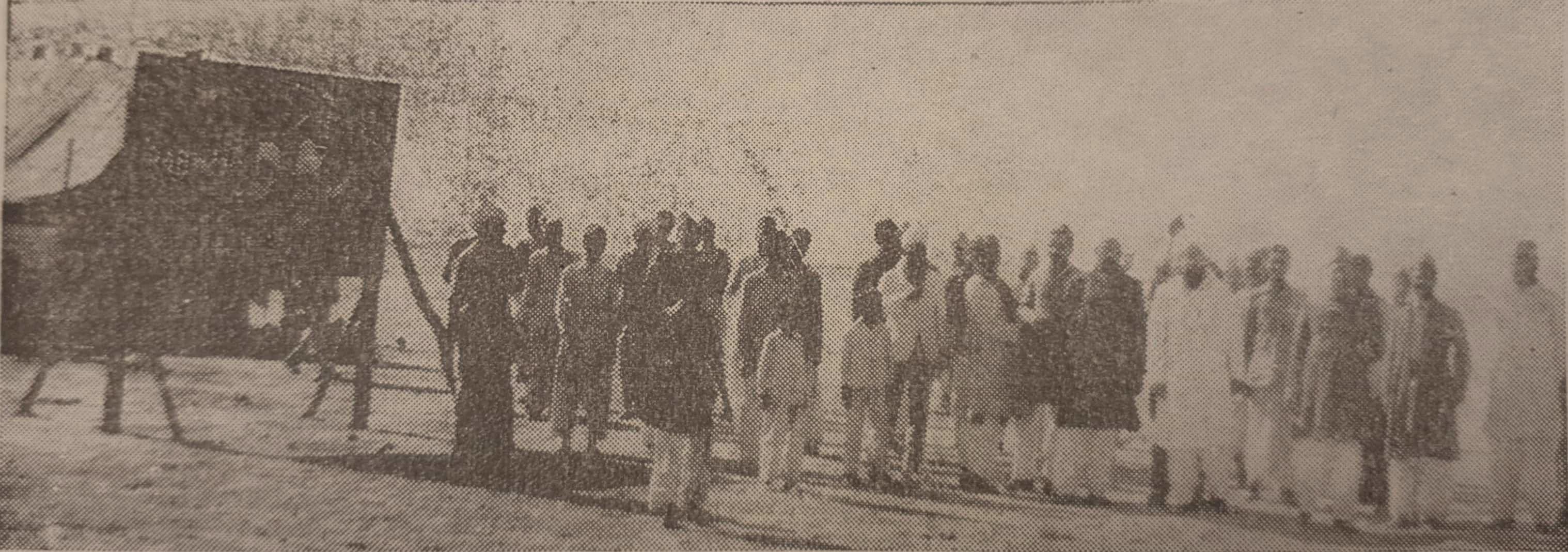
“A group of Lahore journalists had a pleasant outing when they were taken on Sunday to Rabwah—the proposed township site, where the Ahmadiyya community has been granted 1,034 acres of land to rebuild its headquarters. Rabwah is situated about 10 miles from Chiniot on the SheikhupuraSargodha road.
“At an estimated cost of Rs. 13 lakhs, Mirza Bashiruddin Mahmud Ahmad[ra] (the Head) explained to newspapermen, it was planned to build an ideal township with hospitals, educational institutions and research institutes and provide all possible facilities for settlers in an area declared unirrigable and uncultivable by the Government. Attempts will be made to pump water from the River Chenab.
“The party of journalists was also taken fifteen miles further and shown another suitable site for an industrial town eight miles nearer the fertile canal colony town of Sargodha.” (The Civil and Military Gazette, 9 November 1948, p. 4)
The same newspaper, in its 11 November 1948 issue, published a photograph of Hazrat Musleh-e-Maudra, with the following caption:
“Ahmadiyyas’ H.Q.
“Mirza Bashiruddin Mahmud Ahmad[ra] (head of the Ahmadiyya Community), explains to newsmen and others on the site his plans for the new community at Rabwah, near Chiniot—reported and pictured in Tuesday’s ‘C. and M.’” (The Civil and Military Gazette, 11 November 1948, p. 6)
On 27 June 1955, during a speech in Hamburg, Germany, Hazrat Musleh-eMaudra narrated the details of the newlyestablished Markaz of Ahmadiyyat, Rabwah, and stated how Allah the Almighty enabled the Jamaat to establish an astonishing town on barren land, which comprised only three tents at the outset. In the beginning, there was very little drinkable water, and when the water samples were sent to Lahore for
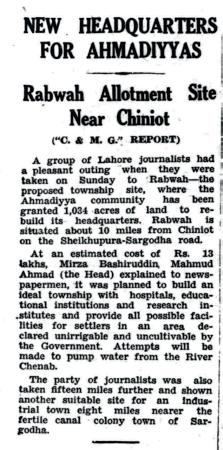
7 AL HAKAM | Friday 22 September 2023
The Civil and Military Gazette | 9 November 1948 The Civil and Military Gazette | 30 December 1955
Non-Ahmadi journalists and Ahmadis with Hazrat Musleh-e-Maudra in Rabwah | The Civil and Military Gazette, 9 November 1948
assessment, the doctors declared it to be harmful to humans. At that time, Huzoorra stated, Allah the Almighty told him through a revelation that drinkable water would surely be available there, and now, in accordance with the promise of Allah, there is enough drinkable water. Huzoorra said that it was a great sign of the existence of Allah and the truthfulness of Ahmadiyyat.
Reporting on this, a local newspaper, Hamburger Anzeiger, wrote on 28 June 1955:
“The head of the Islamic Ahmadiyya Movement, Caliph Hazrat Mirza Mahmud Ahmad[ra] [...] described at a reception in the Europäischen Hof how the current headquarters of the movement ‘Rabwah’ in Pakistan was founded in 1950 [sic, 1948]. From a village in the middle of a desert, it has developed into a large city with secondary schools and a seminary for Muslims.” (“‘Prince of the Faithful received at Town Hall’: Hazrat Musleh-e-Maud in Hamburg, Germany, 1955”, Al Hakam, 18 August 2023, Issue 283, p. 11)
In the following decades — prior to the anti-Ahmadiyya laws that prohibited Ahmadis from professing their Faith and the subsequent migration of Khilafat from Pakistan — the humble town of Rabwah served as a great centre for the propagation of the peaceful message of Islam to all corners of the world.
Early Jalsas
Reporting on the second Jalsa Salana Rabwah, held on 26 to 28 December 1949, The Civil and Military Gazette wrote:
“World Ahmadya Conference at Rabwah
“A representative conference of Ahmadis from all over the world will be held shortly
at Rabwah, the Pakistan headquarters of the community, it is learned.
“The conference will review world conditions, in the light of which it will decide on ‘better and more effective ways of propagating Islam in foreign countries.’
“It is expected that, two representatives each from Britain, Europe, the Middle and Far East, America and Africa will participate in the conference, in addition to one missionary from each of the 70 missionary centres which the Ahmadya community has overseas.
“The conference will be held early next year, after the forthcoming annual session of the Ahmadya community, which will be held at Rabwah from December 26 to December 28.—Star.” (The Civil and Military Gazette, 18 December 1949, p. 5)
After the Jalsa, the same newspaper wrote:
“Rabwah, Dec 30 (Star).—The three-day annual session of the Ahmadya community held at Rabwah, its new headquarters in Pakistan, concluded last night. Nearly 30,000 Ahmadis from all over the world attended. […] A resolution was unanimously passed felicitating Indonesia on the attainment of her freedom.” (The Civil and Military Gazette, 31 December 1949, p. 11)
Reporting on the Jalsa Salana Rabwah 1955, The Civil and Military Gazette wrote under the heading “Ahmadiya Conf. Concludes”:
“The ninth international conference of Ahmadiya community concluded at Rabwah yesterday.
“More than 30,000 Ahmadis from all over Pakistan, Indonesia, East and West Africa, Egypt, Palestine, India and European
countries attended the conference. [...] The conference, besides other prominent community leaders, was addressed by Mirza Bashiruddin Ahmad Mahmood[ra], Head of the community, and Chaudhri Muhammad Zafrullah Khan, Judge of the International Court at The Hague.
“‘Ultimate victory of Islam is bound to come,’ declared Mirza Bashiruddin Mahmood Ahmad[ra], while addressing a mammoth gathering at the closing session of the conference. He made an impassioned appeal for united effort to promote true knowledge and [the] true meaning of the message and teachings of the Holy Quran.” (The Civil and Military Gazette, 30 December 1955, p. 3)
Mentioning the special trains for the Jalsa Salana Rabwah in 1956, a news report stated:
“Special Trains to Rabwah
“The NWR administration will run special trains from Lahore, Sialkot, Narowal, Lyallpur and Sargodha to Rabwah from December 25, in connection with the Ahmediya community annual conference to be held at Rabwah from December 26 to 28, it was announced in Lahore on Thursday.— APP” (The Civil and Military Gazette, 21 December 1956, p. 3)
Visitors
Obviously, Rabwah attracted the attention of Ahmadis from all over the world – due to the presence of Khilafat-e-Ahmadiyya –but one must note that this small town also hosted various dignitaries, officials, and people belonging to different walks of life, who had the opportunity to meet Hazrat Khalifatul Masih.
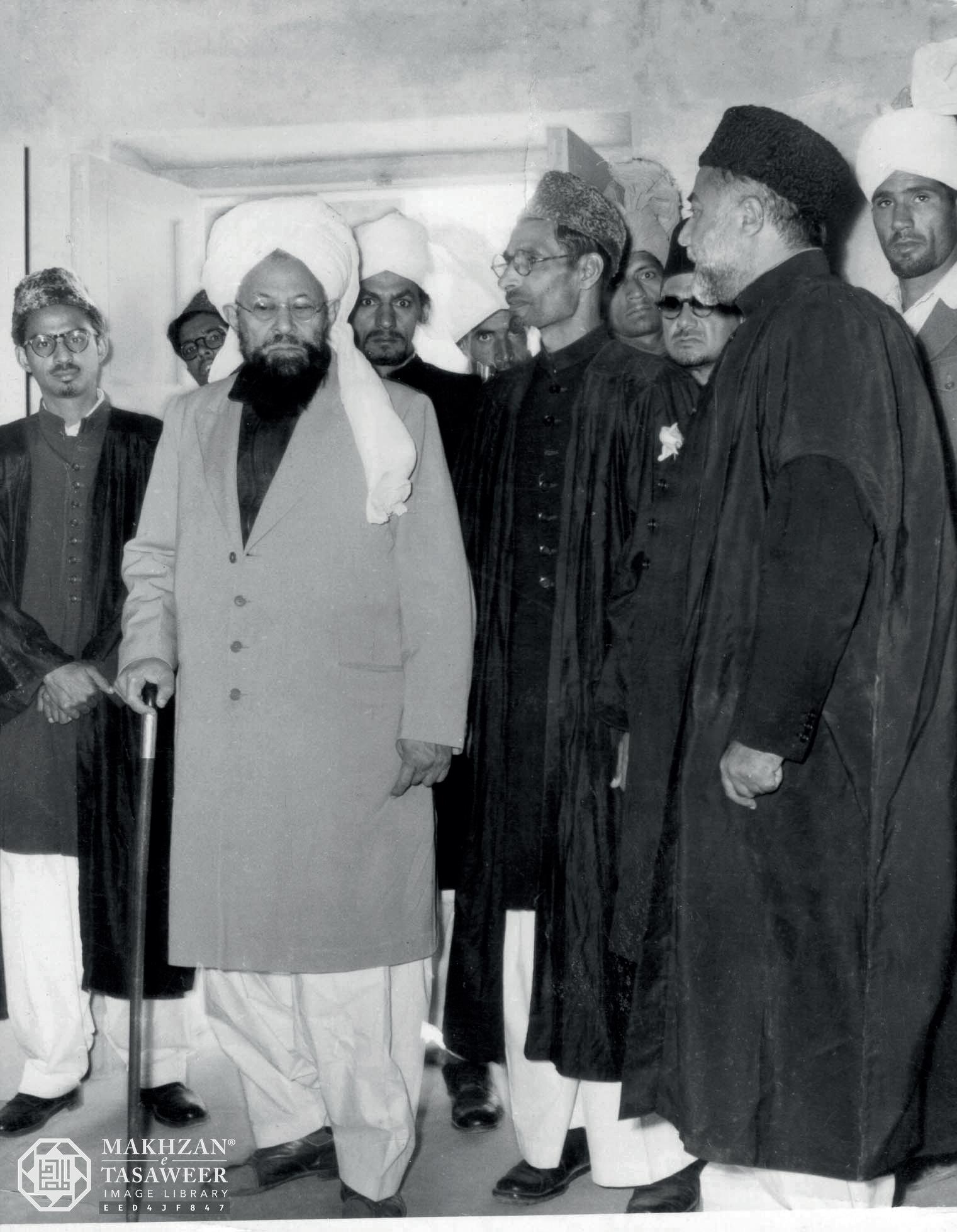
For instance, in January 1951, Alhaj Abdul Wahhab al-Askari of Iraq visited Rabwah. He was the representative of Iraq in the يمالسإلا ملاعلا رمتؤم (World Muslim Congress), and the editor of an Arabic magazine, As-Salaam al-Baghdadia. On 24 January, a reception was held in his honour. (Tarikh-e-Ahmadiyyat, Vol. 13, pp. 294-295)
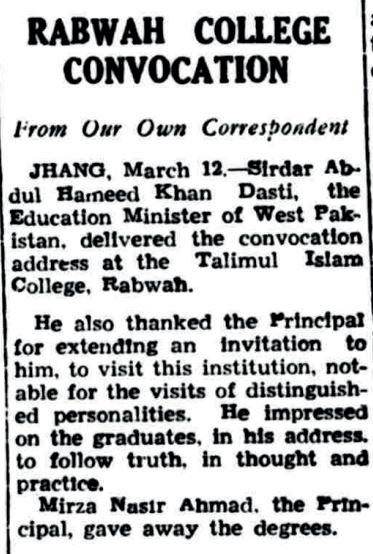
On 23 April 1951, the Punjab’s Rehabilitation Minister, Sheikh Fazal Ilahi Pracha visited Rabwah and had a meeting with Hazrat Musleh-e-Maudra. Reporting on his visit, The Civil and Military Gazette reported:
“The Punjab Rehabilitation Minister, Sheikh Fazal Ilahi, who is touring Jhang, Sargodha and Gujrat districts to gather firsthand impressions about the rehabilitation and land settlement work in the province, arrived in Sargodha on Monday. [...] On his way to Sargodha, the Minister paid a visit to the Ahmadiya colony of Rabwa where he met Mirza Bashiruddin Mahmud[ra], head of the Ahmadiya community, foreign students at the colony and leaders of the community.”
(The Civil and Military Gazette, 25 April 1951, p. 4)
Another visitor was a professor at Forman Christian College Lahore, Stanley Brush (1925-2016), who visited Rabwah during the Jalsa Salana and met with Hazrat Musleh-e-Maudra. For more details on his visit, see “Guests of a Caliph – December 1953”, Al Hakam, 12 October 2018, Issue 30, pp. 6-7)
Education and academics
Soon after its establishment, Rabwah became a centre of academic excellence,
under the guidance and supervision of Hazrat Musleh-e-Maudra. Talim-ul-Islam College was a shining example of Rabwah being an epicentre of academic excellence. After the Partition of India, Talim-ul-Islam College was initially established in Lahore, and then in 1954, it was shifted to Rabwah. Talim-ul-Islam College would host various academic debate competitions as well. For instance, a report stated:
“Inter-Collegiate Debate at Rabwa
“Rabwah, Feb. 14—An Inter-collegiate debate in Urdu was held at T.I. College, Rabwah. The topic for the debate was: ‘Is iwan ki rai men Aqwam-i-Muthadda ka wajood aman-i-alam ki rah men sab se bari rukawat hai.’” (The Civil and Military Gazette, 15 February 1956, p. 3)
In addition to Urdu, Rabwah hosted English debate competitions as well:
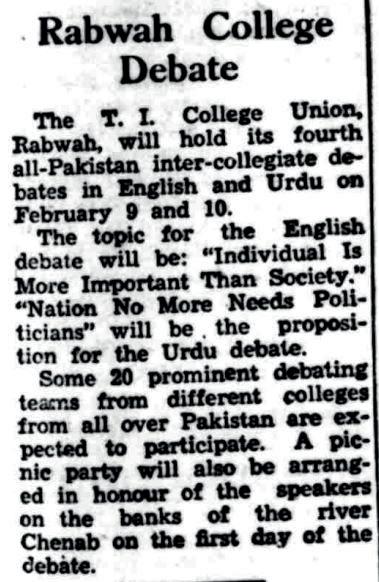
“Rabwah College Debate
“The T.I. College Union, Rabwah, will hold its fourth all-Pakistan inter-collegiate debates in English and Urdu on February 9 and 10. The topic for the English debate will be: ‘Individual Is More Important Than Society.’ ‘Nation No More Needs Politicians’ will be the proposition for the Urdu debate.
“Some 20 prominent debating teams from different colleges from all over Pakistan are expected to participate. A picnic party will also be arranged in honour
Friday 22 September 2023 | AL HAKAM 8
The Civil and Military Gazette | 13 March 1957 The Civil and Military Gazette | 4 February 1958
of the speakers on the banks of the river Chenab on the first day of the debate.” (The Civil and Military Gazette, 4 February 1958, p. 5)
On 13 February 1958, the same newspaper published a photograph of some college students with Hazrat Hafiz Mirza Nasir Ahmadrh, the then Principal of the TI College, under the heading “Debate at Rabwah”, with the following caption:
“Some of the prize-winners with the Principal of the TI College at Rabwah after the fourth annual All-Pakistan interCollegiate debate there.”
On 19 June 1955, Mian Afzal Hussain (1889-1970), the then Vice-Chancellor of the Punjab University, visited Rabwah and addressed the Convocation ceremony of the Talim-ul-Islam College. The Civil and Military Gazette published a detailed report on this event, along with some photographs, under the heading “Train Students to be Good Citizens – Talim-ul-Islam College Convocation”:
“The Principal of the College, Mirza Nasir Ahmad, in his report, supported the stand taken by the Vice-Chancellor in regard to restricted admissions to colleges. Reviewing the history of the college, the Principal said despite various setbacks which the institution received one after the other, it had made commendable progress in every field and today ranked among the best institutions of the province.
“He also demanded revision in the present system of granting Government aid to private colleges and suggested efficiency as the only criterion for the assessment of the grants.
“Agreeing to the view of the Principal, Mian Afzal Hussain said: ‘He favoured the idea of giving grants on the recommendation of the University, as it was most competent to assess the needs of various institutions.’”
(The Civil and Military Gazette, 21 June 1955, p. 3)
On 12 March 1957, the then Education Minister of West Pakistan, Sirdar Abdul Hameed Khan Dasti, addressed the Convocation of the Talim-ul-Islam College Rabwah:
“Rabwah College Convocation
“From Our Own Correspondent
“Jhang, March 12—Sirdar Abdul Hameed Khan Dasti, the Education Minister of West Pakistan, delivered the convocation address at the Talimul Islam College, Rabwah.
“He also thanked the Principal for extending an invitation to him to visit this institution, notable for the visits of distinguished personalities. He impressed on the graduates, in his address, to follow truth, in thought and practice.
“Mirza Nasir Ahmad, the Principal, gave away the degrees.” (The Civil and Military Gazette, 13 March 1957, p. 4)
Sports
This small town of Rabwah not only became a hub of academic excellence, but it also flourished in the field of sports. Below are some glimpses from the early years.
On 1 April 1951, The Civil and Military Gazette published a photo under the heading “Indo-Pakistan Volleyball Contestants”, with the following caption:
“The three Pakistani teams, namely the Muslim Sports, the United Club of Lahore, and the Ahmadiya Club, Rabwah,
who participated in the first Indo-Pakistan Volleyball Tournament held at Batala.”
In its 15 February 1955 issue, the same newspaper wrote under the heading “T.I. College Win Championship – Rowing tourney”:
“T.I. College, Rabwah, won the Ghani Zaman Open Rowing Championship with 18 points which concluded on Sunday at the River Ravi.” (The Civil and Military Gazette, 15 February 1955, p. 6)
The same newspaper wrote on 25 November 1955, under the heading “Pakistan Volleyball Tournament”:
“Okara. Nov. 24—Eight matches were decided today in the All-Pakistan Volleyball Tournament held in the Municipal Park here.
“The match between Rabwah and Peshawar Volliers which ended in the former’s victory, was most thrilling.” (The Civil and Military Gazette, 25 November 1955, p. 6)
Reporting on the Table Tennis competition of the Talim-ul-Islam College, the same newspaper wrote under the heading “Talimul Islam College annual sports”:
“Staff Singles: Mirza Nasir Ahmad, Principal, beat Prof. Naseer Ahmad Khan.” (The Civil and Military Gazette, 11 February 1956, p. 5)
Mentioning a hiking trip by the Talimul-Islam College, a report stated:
“Hiking Club proceeds on tour of Swat
“The TI College Hiking Mountaineering and Youth-Hostelling Club left Rabwah on July 1, for a month’s tour of Swat. The
party consisted of 16 members including three professors. The party took with them medicines like quinine etc. to be distributed free.” (The Civil and Military Gazette, 3 July 1956, p. 6)
On 23 February 1957, Talim-ul-Islam College, Rabwah, won the Bumping Boat Race. A report stated under the heading “T.I. College Win Bumping Boat Race Trophy”:
“The Punjab University bumping boat race competition concluded yesterday when the Talimul Islam College, Rabwah, won the championship by maintaining their lead throughout the competition.” (The Civil and Military Gazette, 24 February 1957, p. 8)
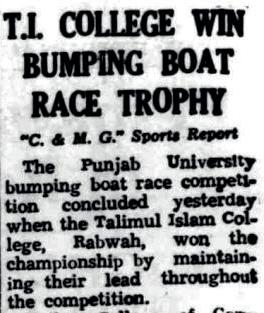
Mentioning TI College’s victory in the West Pakistan Rowing Championship, a report stated:
“Victory to T.I. College
“W. Pakistan Rowing Championship
“‘C. & M. G’ Sports Report
“Talimul Islam College, Rabwah, won the West Pakistan open rowing championships, which concluded in Lahore yesterday afternoon on the Ravi.” (The Civil and Military Gazette, 9 March 1957, p. 12)

On 11 November 1957, the Talim-ulIslam High School won a football match against the Sadhorah Muslim High School. A report stated under the heading “Talimul Islam XI Beat Jhang School”:
“Jhang, Nov. 11—The Talimul Islam High School (Rabwah) sent a football team here Last Friday.
“In a match with the Sadhorah Muslim High School, the visitors beat the home team by three goals to nil. The general standard of the game was high and the finishing of the
Rabwah team was particularly good.” (The Civil and Military Gazette, 12 November 1957, p. 12)
In 1958, Talim-ul-Islam College, Rabwah, won the West Pakistan Open Rowing:
“T.I. College Win Championship
“West Pakistan Open Rowing Concludes
“‘C. & M. G.’ Sports Report
“Talimul Islam College, Rabwah won the 11th West Pakistan Open Rowing Championship Trophy with 28 points which concluded last evening at the West Pakistan Rowing Association Training Centre, river Ravi, Lahore, before a fairly large gathering.” (The Civil and Military Gazette, 22 February 1958, p. 11)
Mentioning a Kabaddi tournament, a news report stated under the heading “Victory for T.I. College”:
“Interesting Kabaddi witnessed yesterday afternoon, the opening day of the Panjab University Kabaddi Tournament when Talimul Islam College, Rabwah, defeated Islamia College Lahore by 35 points to 28 after a well-contested quarter-final at the Panjab University ground Lahore.” (The Civil and Military Gazette, 30 September 1958, p. 12)
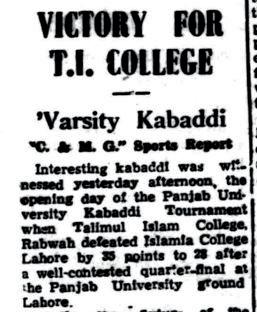
The same year, Talim-ul-Islam College Rabwah won the Punjab University (North Zone) Football tournament. A news report wrote under the heading “T.I. College Win ‘Varsity Zonal Soccer”:
“Sargodha. Oct. 24—Talim-ul-Islam College of Rabwah became champion of Punjab University (North Zone) Football Tournament when they eliminated Government De’Montmorency College Sargodha yesterday in their third meeting at Rabwah.” (The Civil and Military Gazette, 25 October 1958, p. 6)
Reporting on the Punjab University’s Basketball tournament, a news report stated under the heading “TI College in Varsity Final – Board Basketball”:
“Talimul-Islam College, Rabwah will meet Forman Christian College in the final of the Panjab University Basketball Tournament when the T.I. College eliminated the Murray College, Sialkot by 33 points to 26 while the Formanites defeated the Gordon College, Rawalpindi, by 61 points to 38 in the second semi-final on Friday evening at the Panjab University ground courts, Lahore.” (The Civil and Military Gazette, 14 November 1959, p. 8)
Healthcare
The small town of Rabwah also developed good quality health facilities. On 21 March 1958, Hazrat Musleh-e-Maudra inaugurated the Fazl-e-Omar Hospital building. A news report stated under the heading “New Hospital in Rabwah”:
“The Ahmadiya Community Chief, Mirza Bashiruddin Mahmood Ahmed[ra], inaugurated the newly-built Fazli-Omar Hospital here.
“The hospital is scheduled to have eight blocks, out of which two blocks have been completed. The Chief Medical Officer of the hospital, Dr. Sahibzada Mirza Munawar Ahmed, said after the inaugural ceremony that the hospital was equipped with full modern surgical equipment and on completion would be one of the best hospitals of Pakistan.” (The Civil and Military Gazette, 23 March 1958, p. 13)
9 AL HAKAM | Friday 22 September 2023
The Civil and Military Gazette | 9 March 1957 The Civil and Military Gazette | 30 September 1958 The Civil and Military Gazette | 24 February 1957
It is impossible to overstate the significance of gratitude to Allah the Almighty, as He is not only our Creator but also the Provider of all that is necessary for our existence. Being grateful to God Almighty is the least we can do to remember His countless blessings upon us and hope for more in return, as Allah the Almighty says:
“And remember the time when your Lord declared, ‘If you are grateful, I will, surely, bestow more favours on you.’”
(Surah Ibrahim, Ch.14: V.8)
Showing gratitude to Allah the Almighty is due upon us, as He has not just tended to those of our needs that we consider necessary, but additionally granted us significantly more to satisfy our future requirements as well. However, only a few are truly thankful for divine favours, as God Almighty says:
“Few of My servants are grateful.”
(Surah Saba, Ch.34: V.14)
Gratitude Key to receiving divine blessings
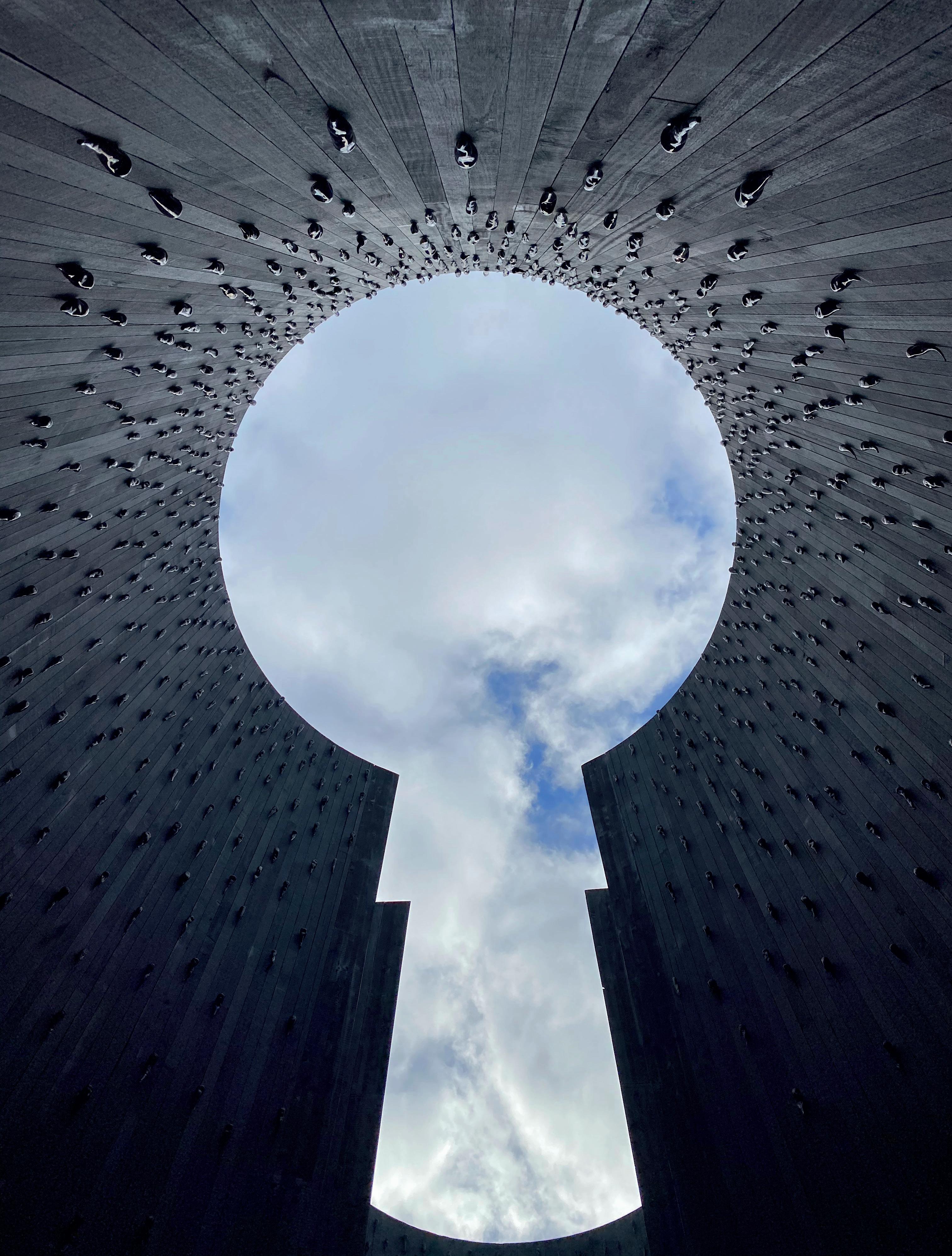
Friday 22 September 2023 | AL HAKAM 10
M Adam Ahmad Al Hakam
مکندیزال مترکش نئل مکبر نذات ذاو
وکشلا یدابع نم لیلق
ر
Jane Slack-Smith| Unsplash
Gratefulness of Prophet Muhammadsa
Recognising that no one could ever repay the infinite blessings bestowed upon humanity, the greatest of God’s servants and the seal of all prophets, Hazrat Muhammad al-Mustafa, peace be upon him, expressed immense gratitude to Allah the Almighty.
shows gratitude for His bounties, He shall increase His bounties upon such a one; but if one is ungrateful for His blessings, then remember that such a one shall be seized by a grievous punishment.” (Malfuzat [English], Vol. 1, pp. 152-153)
Act with gratitude
Hazrat Mughirara narrates, “The Holy Prophetsa used to stand in the prayer or pray till both of his feet or legs would swell. He was asked why he offered such an unbearable prayer, to which he replied, ‘Should I not be a thankful servant?’”
(Sahih al-Bukhari, Kitab at-tahajjud, Hadith 1130)

The Holy Prophetsa set a timeless example of gratitude to Allah the Almighty because he knew that the divine bounties are immeasurable, from life itself to the countless bounties of God Almighty. The above-mentioned hadith should serve as a reminder to all and sundry that they should express gratitude for the unrepayable blessings of God Almighty.
Look at the less fortunate
A sense of gratitude to God Almighty also arises in a person when they observe the state of the less fortunate of the society. The Holy Prophetsa said:
“Look at those who are lower than you [i.e., in health, status, fortune, etc.] and do not look at those who are at a higher level than you, for it is the best way not to disparage the favours Allah the Almighty.”
(Sahih Muslim, Kitab az-zuhd wa r-raqa’iq, Hadith 2963c)
This is golden advice, as when a person realises that there are a lot of people around him who do not have those things that he possesses, his heart is naturally inclined towards God Almighty in humility and gratitude. The Promised Messiahas said:
“Do not take pride in your resolve and effort, and do not surmise that any achievement is due to any capability in you or effort on your part. On the contrary, you ought to believe that the merciful God, who does not let anyone’s sincere effort go in vain, has given you the fruits of your labour. Do you not observe that every day hundreds of students fail their examinations? Do all of these students not make an effort, or are they foolish and mindless? Not at all. Some of them are so intelligent and bright that they are sharper than many of the students who have passed.
“Therefore, it is necessary and incumbent on a believer to perform prostrations of gratitude before God Almighty whenever they are blessed with an achievement that God did not let their effort go in vain. The result of this gratitude will be that a person will increase in their love of God Almighty and grow in faith. In fact, this is not all; such people will be graced with even further successes because God Almighty states that if one
Gratitude to God Almighty should also be practically manifested in our life. This practice teaches us to value different aspects of our lives and is an expression of a deep spiritual connection with Allah the Almighty. Explaining the verse دواد لا اولمعا ارکش (i.e., “Act gratefully, O House of David” [Surah Saba, Ch.34: V.14]), Hazrat Mirza Nasir Ahmad, Khalifatul Masih IIIrh said:
“As far as the Supreme Being of Allah the Almighty is concerned, the meaning of gratitude is that for what God has given us, we offer thanks to Him through our actions in the form of self-sacrifice and by serving His people and fulfilling the rights made obligatory upon us by Him. He always gives and does not need anything in return, as everything belongs to Him, but man offers something to God in the way [of gratitude] that I have just mentioned.
“It is for this very reason that at one place in the Holy Quran, Allah the Almighty says: ارکش دواد لا اولمعا [“O house of David! Act with gratitude” (Surah Saba, Ch.34: V.14)]. That means God told them to act with gratitude. Filling the heart with feelings of gratitude or praising Him with words is not mentioned here. Moreover, people glorify and exalt Allah the Almighty innumerably at different times, but this too is not mentioned here; rather, it is said that they should offer thanks with their actions. That’s why in Arabic, the meaning of offering gratitude to Allah the Almighty has also been linked with javarih, which means that all the powers that have been given to man should be used in such a way that they are supposed to be thanking God Almighty. Thus, a person cannot truly be successful until they practically offer thanks to Allah the Almighty.
“It is for this very reason that not just reciting basmalah before eating food or saying alhamdulillah after finishing a meal is a sign of gratitude, but the act of eating food itself is equivalent to being thankful to Allah the Almighty, because starving oneself to death is not allowed in Islam. The Holy Prophetsa is reported to have said, “O man! You owe a duty to your body as well.” [Sahih al-Bukhari, Kitab as-Saum, Hadith 1968] Therefore, offering gratitude [to Allah] also means that wherever a right is owed to you and the power to fulfil that right is given to you, then the right should be paid in such a way that it is in accordance with the will of the Almighty God and His commandments. Moreover, [the rights should be fulfilled] by utilising all the means provided by Allah the Almighty.
“Thus, unless one does not act with gratitude, success is not obtained. For example, an intelligent child is ungrateful and unsuccessful if he does not use his God-given intelligence properly or if he wastes his time and does not concentrate on studying and acquiring knowledge.
“Hence, ingratitude is the reason for failures. Where you observe ingratitude, you will see failure. On the other hand, success requires one to be grateful in the
sense that I have just explained. I pray to Allah the Almighty to grant us with His grace the ability to understand this central and fundamental point.” (Khutbat-e-Nasir, Vol. 5, pp. 1-2)
True gratefulness
Sincere gratitude for God Almighty transcends mere words and lip service. It is demonstrated by righteousness and fear of Allah the Almighty. By living a pious life, we honour God’s favours upon us and recognise His commandments. The Promised Messiahas said:
“Your true expression of gratitude is by adopting righteousness and purity. To merely respond by saying Alhamdulillah (all praise belongs to Allah) when asked if you are a Muslim does not constitute thankfulness and appreciation. If you pay true gratitude, i.e., if you tread the ways of purity and righteousness, I give you glad tidings that when you stand at the frontier, as it were, no one can gain dominance over you.” (Malfuzat [English], Vol. 1, p. 75)
Our responsibility
Recounting the blessings of Allah the Almighty on the Ahmadiyya Muslim Jamaat, the present head of the community, Hazrat Khalifatul Masih Vaa said:
“If Ahmadi families have grown in number and their wealth has increased, and Allah the Almighty has also granted expansion to the Jamaat in terms of manifest buildings, then these [blessings] should certainly oblige every one of us to express gratitude to God Almighty. How could this gratefulness be demonstrated? What are its requirements?
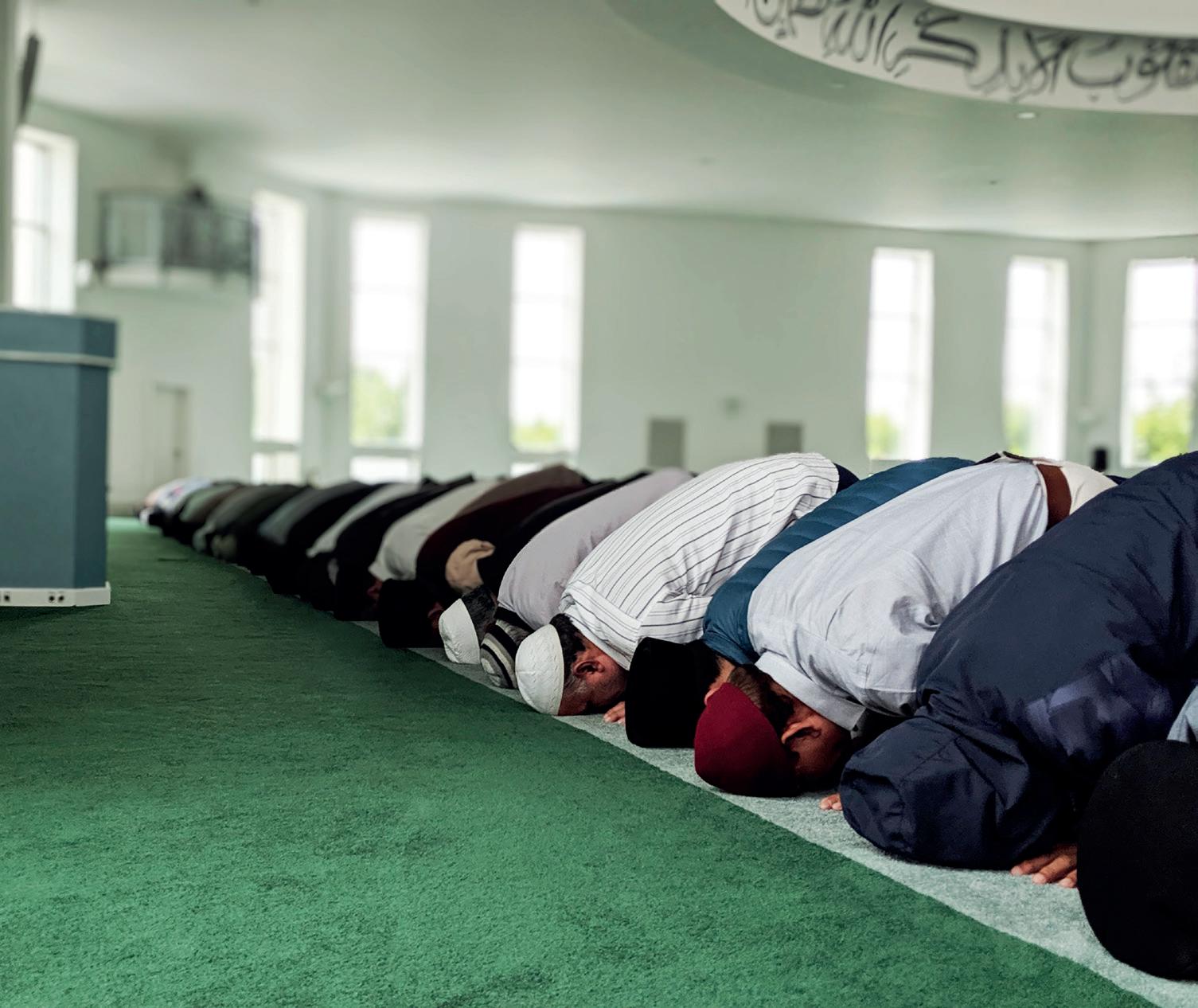
“We, who have accepted the Imam of the age, believe that we have accepted that chosen one [of God Almighty] about whom the Holy Prophetsa had said that even if faith ascended to the Pleiades [completely disappearing from the earth], he would restore faith [back] to earth. Therefore, we [the followers of the Promised Messiahas] should also make our thoughts in line with the thoughts of the true believers. We should not be pleased with expressing words of gratitude or merely paying lip service by uttering
Alhamdulillah. [We should self-reflect and] think about whether we are putting God’s commandments into practice. Are we spending our lives like the true believers as explained by Allah the Almighty and His messenger Prophet Muhammadsa and as unfolded in this age by the Promised Messiahas?” (Friday Sermon, 6 May 2016)
Prayer of Prophet Ahmadas “O Lord of all the worlds! It is beyond me to offer You gratitude for all Your favours. You are most Merciful and Compassionate, and the bounties that You have conferred upon me are countless. Forgive me my sins, lest I am ruined. Fill my heart with sincere love for You, so that I may receive life. Cover my faults and allow me to perform such deeds that become the source of Your pleasure. I seek refuge in Your noble countenance lest your punishment befalls me. Have mercy and save me from the calamities of this world and the hereafter, for all grace and compassion is in Your hand. Amin, and again, Amin.” (Malfuzat [English], Vol. 1, p. 241)
Conclusion
As our maker, Allah the Almighty has created us with great care and granted us a life and a conscious mind with the ability to experience the world around us. Every beat of our hearts and every breath of our lives is a testament to His divine blessings and bounties upon humanity. Consequently, immense gratitude to God Almighty is due to us, as the Promised Messiahas said, “Keeping in mind the blessings and bounties conferred by Allah the Exalted for human development and perfection, man should render thanks to Him. He should ponder as to who has bestowed all these faculties upon him. It is man’s choice to be grateful or not, but if he possesses a rightly inclined nature and ponders over it, he will find that all the faculties – overt and covert – have been granted to him by Allah the Exalted alone, and they are fully under His control. He can amplify them out of gratitude or diminish them in an instant out of ingratitude.” (Malfuzat [English], Vol. 10, p. 495)
11 AL HAKAM | Friday 22 September 2023
ہللا یلﺻ یبنلا نا� نإ لوﻘ� ہنع ہللا یﺿر ة�یغملا ہل لاﻘیﻓ ،هاقاس وأ هامرت یتح یلﺼیِل موﻘیل ملسو ہیلع اروکش ادبع نوﻛأ ا�ﻓأ لوﻘیﻓ
مکقوﻓ وﻫ نم یلإ اور�نت الو مکنم لﻔسأ نم یلإ اور�نا ہللا ﺔمﻌ� اوردﺰت ال نأ ردجأ وہﻓ
BRICS Summit 2023 Charting a new global order?

Muhammad Al-Fayyad Timehin Student Jamia Ahmadiyya International Ghana
Last month, Johannesburg was host to arguably one of the most memorable and talked-about BRICS summits. BRICS stands for Brazil, Russia, China, and South Africa, and it was initiated in 2009 by the aforementioned countries with the goal of charting a new world economic order based on justice and equity.
The BRICS countries have expressed their desire to envision a new world order in which nations can freely trade using their own currencies without the need for USAID or any other currency. (www.bbc.com/news/ world-africa-66609633)
However, BRICS is primarily understood as an organisation that rivals the G7 countries, which are predominantly dominated by European states and the United States of America, on the world stage.

The highlight of the summit was the inclusion of six new countries into the coalition. This marks their first expansion in 13 years and includes Ethiopia, Egypt, Iran, Saudi Arabia, the United Arab Emirates, and Argentina. (www.aljazeera. com/economy/2023/8/24/saudi-arabia-iranto-join-brics-as-grouping-admits-six-newmembers)
Dozens of nations in the global south have expressed their interest in joining the bloc as they seek a path to development in a world rife with injustice against them. Despite calls for a reform of the international financial institutions that do not reflect the current economic situation, there has been no significant change in the system. Clearly, the way forward involves an overhaul of the current financial institutions. According to the founders of BRICS, the organisation is also willing to mitigate the problems that countries in the global south face in the world today.
Hazrat Amirul Momineenaa has reiterated the same message that rich countries should help less privileged countries, as that is the panacea for global peace and the way to bridge the economic divide.
In 2016, Hazrat Khalifatul Masih Vaa delivered an address at York University in Toronto in which he stated:
“Leading on from this, the same principle of fulfilling trusts and oaths is something that the major powers and international institutions such as the United Nations must always prioritise. Weaker nations are often forced to rely on the support of more powerful and richer countries, and so the
latter should seek to fulfil the trust that those less economically developed nations place in them. They should try to sincerely help them stand upon their own two feet and realise that it is in the world’s interest for weaker nations to develop and prosper.” ( www.reviewofreligions.org/12839/justicein-an-unjust-world-2/)
United Nations Secretary-General Antonio Guterres, at the summit, said: “Today’s global governance structures reflect yesterday’s world,” he added, “For multilateral institutions to remain truly universal, they must reform to reflect today’s power and economic realities.” (www. reuters.com/world/brics-poised-invite-newmembers-join-bloc-sources-2023-08-24/)
For a long time, BRICS has expressed its ambition to create a more inclusive and egalitarian monetary system, which would be a more viable option for third-world countries in their quest for development.
“BRICS countries can collectively shape global dynamics, and acting together, they have the potential to drive significant changes in the world economy and international relations”, said South Africa’s president, Cyril Ramaphosa, in an address to the South African people before the threeday summit. (www.thepresidency.gov.za/ speeches/address-president-cyril-ramaphosasouth-africa%27s-foreign-policy)
“BRICS has embarked on a new chapter in its effort to build a world that is fair, a world that is just, a world that is also inclusive and prosperous,” Cyril Ramaphosa added at the summit. (https://www.reuters.com/world/ brics-poised-invite-new-members-join-blocsources-2023-08-24/)

In 2014, with $50 billion (around €46 billion) in seed money, the BRICS nations launched the New Development Bank as an alternative to the World Bank and the International Monetary Fund. In addition, they created a liquidity mechanism called the Contingent Reserve Arrangement to support members struggling with payments.

Islam has encouraged Muslims to help debtors reimburse their loans or even forgive them if they are unable to pay.
It was narrated that Hazrat Uthmanra heard the Holy Prophetsa say:
“A person who gave more time to a debtor who was in difficulty or waived a debt for one who had a lot of debts, Allah will shade them with His shade on the Day when there will be no shade but His.” (Musnad Ahmad, Musnad Uthman ibn Affan, Hadith 532)
In his recent address delivered at the 2023 Germany Jalsa, Hazrat Khalifatul Masihaa said that contrary to the above standards,
in today’s age, people act with deceit and falsehood and create disorder in terms of loans. Huzooraa added that this was the care the early Muslims paid in terms of helping those in debt; however, Huzooraa added, that it is the responsibility of the one in debt to pay off their loans. (www.alhakam.org/ concluding-address-jalsa-germany-2023/)
Many critics have pointed out that divisions within the bloc itself might affect the decision-making process, and this was indeed the case, as the member countries seem to have distinct reasons for expansion,



and they also prefer different candidates.
Hazrat Khalifatul Masih Vaa, in his address to the city of Glasgow reception on 7 March 2009, said: “Peace depends on justice, and economic progress depends on peace.” (www.alislam.org/articles/peacedepends-on-justice-and-economic-progressdepends-on-peace/)
It remains to be seen if the group will live up to their goals, but there is optimism, especially in the global south, that there
Continued on next page >>
Friday 22 September 2023 | AL HAKAM 12
Maria Stewart| Unsplash
Tom Wilkinson|
Wiki Commons
Waqifeen-e-Arzi from Canada spend their summer serving Jamaica Jamaat
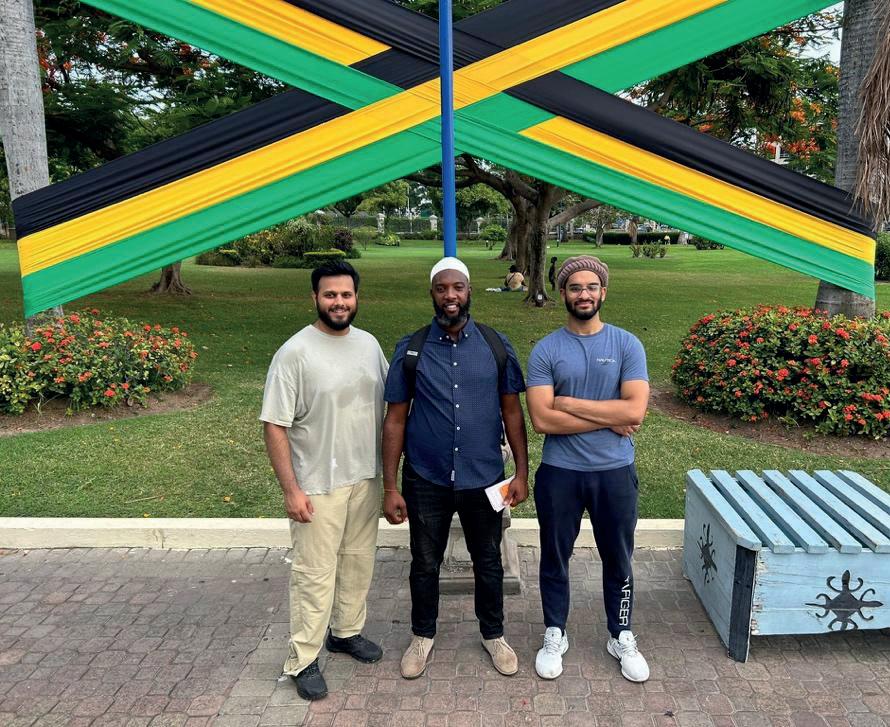
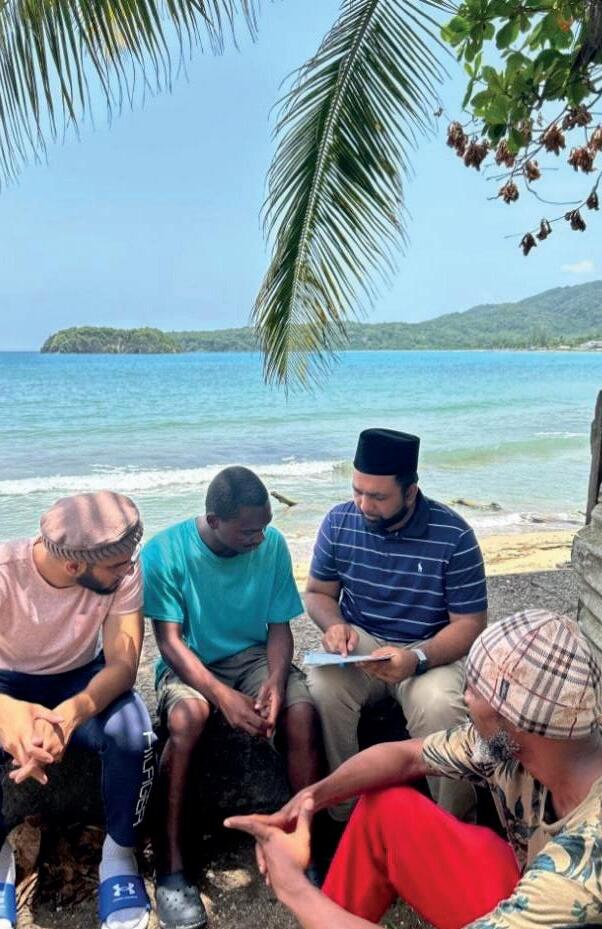
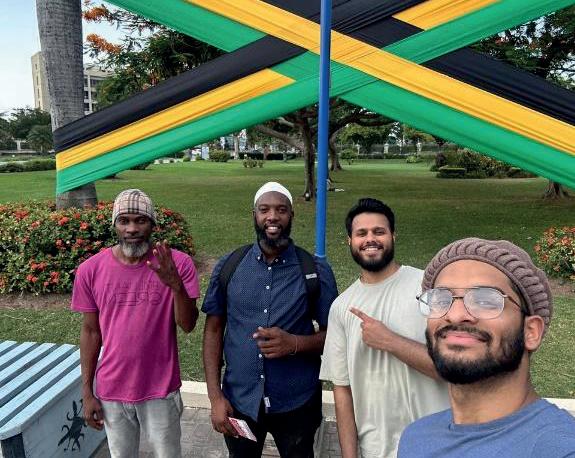
Misbah Anmol Tariq Jamaica Correspondent
Two young volunteers from Canada, Haris Ahmad Sahib and Zeeshan Akif Sahib, dedicated their summer to assisting Jamaat-e-Ahmadiyya Jamaica. Both 7thyear students of Jamia Ahmadiyya Canada arrived in Jamaica in early August and immediately immersed themselves in a whirlwind of activities aimed at nurturing faith, knowledge, and brotherhood. One of their significant contributions was in the field of media. Haris Sahib and Zeeshan Sahib took on the responsibility of making news reports for MTA. These reports not only showcased the activities of the Jamaica Jamaat but also enriched the historical records of our Jamaat. Apart from this, the volunteers actively engaged in various community events. They distributed 4,000 flyers, spreading the message of Islam to the wider community. They also played a pivotal role in educational activities,
<< Continued from previous page
will be a significant transformation in international economic relations. However, real change will only occur when these countries work collectively towards it. They must put their selfish interests aside and work for the good of the world.
The Holy Prophetsa taught Muslims to love for our brothers what we love for ourselves. This is the way society can flourish. To bring about positive change in the economic sector, a system founded on principles of equity and justice is needed. The summit will only be a success if all the parties are prepared to set aside their selfish interests and work together to pave the way for a better future.
During the 2021 annual peace symposium of the Ahmadiyya Muslim Community UK, Hazrat Khalifatul Masih Vaa succinctly pointed out to the high-profile attendees that peace can only be in the world if world leaders champion the path of justice and shun selfishness:
“In addition, the rhetoric of certain powerful world leaders has become increasingly nationalistic and belligerent, they have pledged to put the rights of their own citizens above all others. I do not dispute the fact that it is the responsibility of governments and leaders to look after their own people and to protect their interests. Certainly, as long as the leaders act with justice, and do not infringe upon the rights of others, attempts to better the lives of their citizens is a great virtue. However, policies that are based upon selfishness, greed, and a readiness to forfeit the rights of others are wrong and a means of sowing discord and division in the world”. (www. reviewofreligions.org/13931/leaving-alegacy-for-future-generations-2/)
conducting classes for our nau-mubai‘een (new converts), and teaching them basic Islamic principles.
Haris Sahib and Zeeshan Sahib were instrumental in managing two back-toschool events, drawing over 300 eager participants. They also contributed to a health fair, facilitating access to medical care for hundreds of attendees.
Zeeshan Akif Sahib designed a captivating Holy Quran exhibition for our mosque, enhancing the educational resources available to Jamaat members and guests alike.
Their conduct and tireless dedication left a lasting impression on the Jamaica Jamaat Their service not only enriched the local community but also strengthened the bonds of brotherhood that unite Ahmadi Muslims worldwide.
As the volunteers return to Canada, the Jamaica Jamaat expresses heartfelt gratitude for their invaluable contributions.
Foundation-stone laying ceremony held for Baitul Tauhid Mosque, Huddersfield, UK
Yousaf Aftab President Jamaat-e-Ahmadiyya Huddersfield North
Jamaat-e-Ahmadiyya Huddersfield laid the foundation stone of the Baitul Tauhid Mosque on 10 September 2023.
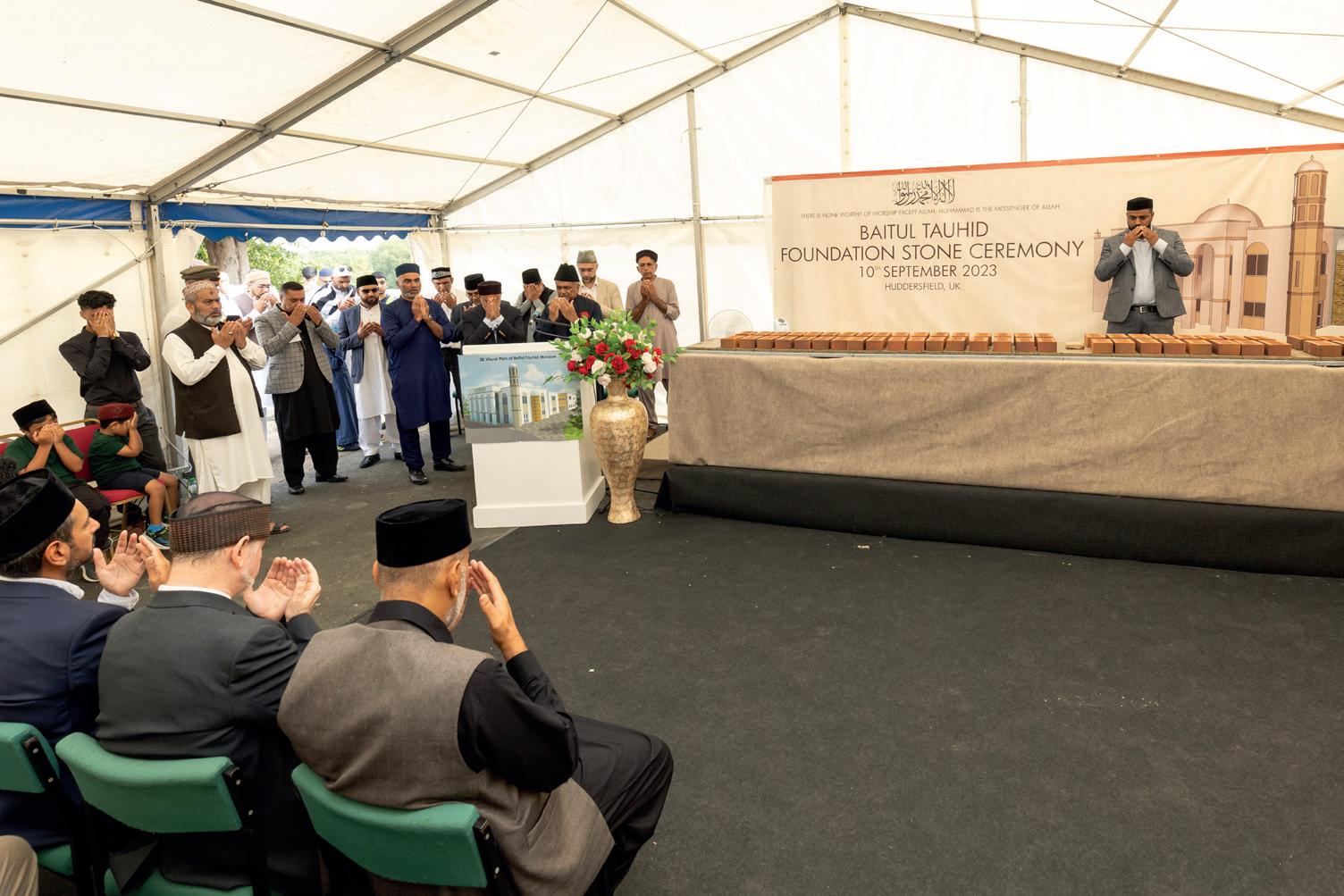
Multiple waqar-e-amal sessions were held to clean the inside of the Baitul Tauhid Mosque and the outer grounds. This would facilitate marquees being set up for the official ceremony and cater to the needs of the local jamaat and central and regional guests.
Huddersfield Jamaat is one of the oldest jamaats, with its establishment in 1962.
The foundation laying ceremony started with the recitation from the Holy Quran with its translation, followed by the history of the Huddersfield Jamaat, and the laying of foundation stones by over 60 members from national, regional, and local levels. The stone placed by Amir Jamaat-e-Ahmadiyya came from Qadian, and Hazrat Amirul Momineenaa had prayed for the mosque and provided him with the stone to use for this mosque.
The session ended with a silent prayer, followed by refreshments.
The formal ceremony commenced with the recitation from the Holy Quran
with its translation, followed by a poem, a welcome address by the Regional Amir and then an address by Amir Jamaat-eAhmadiyya UK, outlining the importance of mosques and financial sacrifice, followed by a question and answer session.
Pledges and payments were also taken on the day, and then the session ended with silent prayer, followed by Zuhr and
Asr prayers.
The overall attendance on the day was 400. The event was covered by MTA UK and Voice of Islam UK.
Information about the event was posted on social media. Many positive messages were received from local members.
13 AL HAKAM | Friday 22 September 2023
Image courtesy of AMJ Canada Image courtesy of AMJ UK
Coming from every distant track
Arjun Singh’s glimpse of Qadian – the abode of peace
A series looking at the high standard of morals of the Promised Messiahas, his Khulafa and the hospitality of the Ahmadiyya Muslim Community when receiving visitors
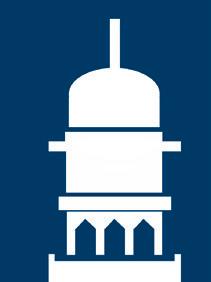
and ethics of the inhabitants of Qadian.
Arjun Singh Sahib writes:
In British India, there was a non-Muslim journalist named Arjun Singh who added the word “Ajiz” to his name and published his newspaper from Amritsar, which he called Rangeen. This journalist was also the owner and publisher of Sardar Press Amritsar, located in the famous Hall Bazaar of Amritsar city. In addition to his writings about the Ahmadiyya Muslim Jamaat, he attempted to present glimpses of the life and achievements of Hazrat Mirza Bashirud-Din Mahmud Ahmad, Hazrat Musleh-eMaudra, in a concise booklet in Urdu titled Khalifa-e-Qadian (Khalifa of Qadian).
Another work of Arjun Singh is titled Sair-e-Qadian - A Journey to Qadian However, it is not evident from this book how many times or when exactly he visited Qadian. Nevertheless, based on his association with Qadian and his residing in the neighbouring city of Amritsar, along with the contents of this book, it can be inferred that his observations about Qadian were not merely based on others’ reporting. In his aforementioned book, Khalifa-eQadian, he recalls watching Hazrat Muslehe-Maud’sra entourage during the famous court case of Syed Ataullah Shah Bukhari in March 1935.
There is no specific information regarding the year of its authorship or publication. Still, judging from the contents of the book, it can be speculated that it was written around the year 1935.
Below are some excerpts from this book that, upon reading, can provide an estimation of the high and exemplary standards of life in the sacred town of Qadian, the birthplace, residence, and final resting place of the Promised Messiahas. The established ideal society of the Ahmadiyya Muslim Jamaat in this sacred town showcases mutual brotherhood and remarkable human progress, which even a non-Muslim can appreciate. The book highly praises the extraordinary development and excellent management of this town, along with the exemplary moral conduct of its residents.
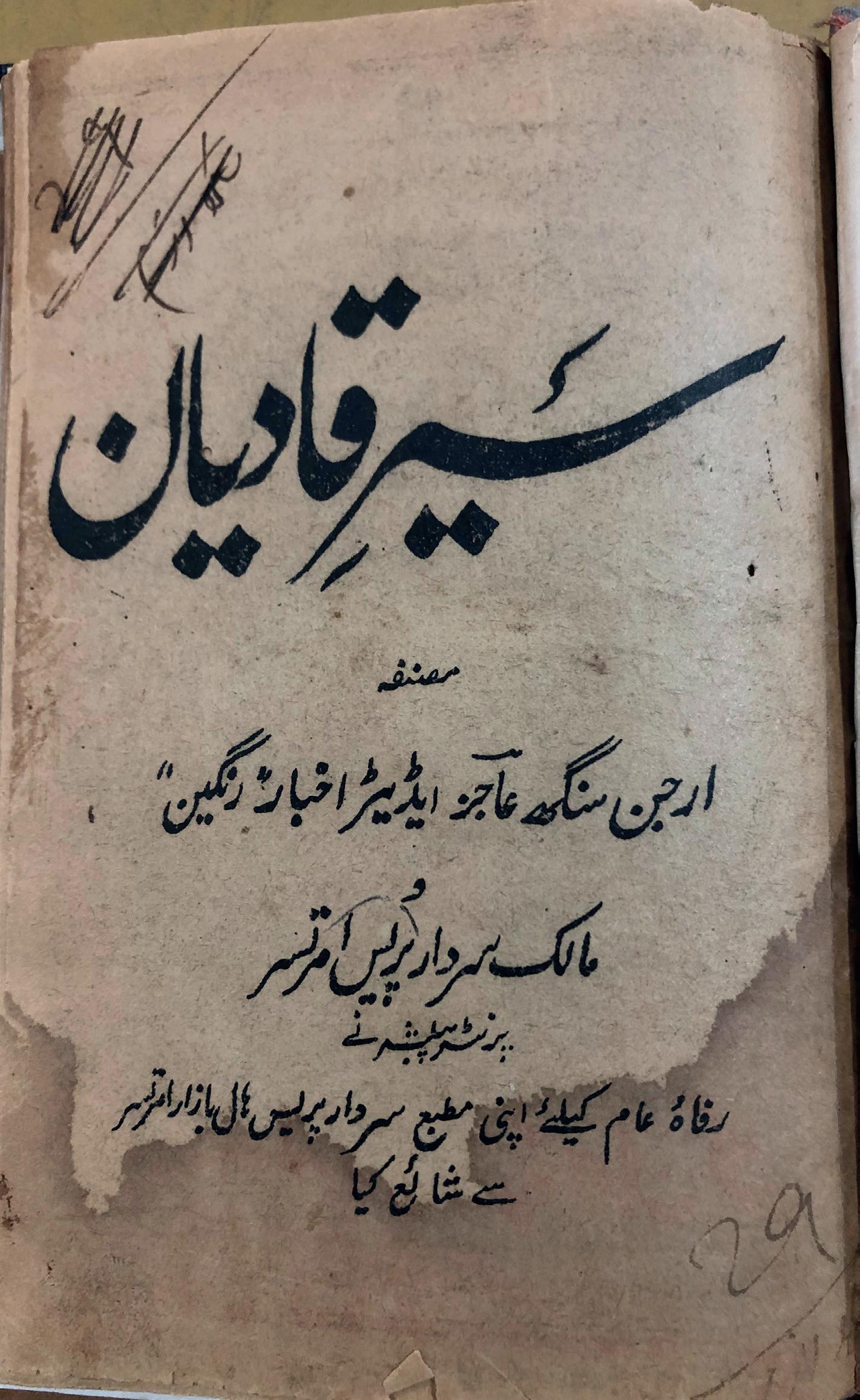
This book is beneficial as it reveals how the place referred to as an “unknown village” emerged as a blossoming garden and began to shine across the world due to its status as the abode of peace. This made people from all walks of life, both natives and strangers, unable to resist their curiosity and fascination for the lives, habits, inclinations,
“Go to Qadian. There, you will see schools, madrasas, and educational institutions for both men and women. It is astonishing that while in other Muslim areas, elders discouraged Muslims from acquiring knowledge and especially learning English, in Qadian, the esteemed elders themselves made arrangements for learning English. They even laid the foundation for enlightening girls with pearls of knowledge. As a result, in Qadian’s women’s schools, hundreds of girls are acquiring education.
“Offices are functioning smoothly with established procedures. There is a department for preaching and propagation and another for education. Some are responsible for internal affairs, while others oversee external affairs, and all these departments are supervised by a senior administrator who looks after their management. In each department, there are several clerks. This well-organised system of Qadian demonstrates that their leader, the Khalifa, is a highly esteemed individual.”
(Sair-e-Qadian - A Journey to Qadian, pp. 8-9)
Afterwards, the author writes with great enthusiasm about the exceptional and high standards of obedience of the members of the Community, the central leadership within the Community, and other positive aspects. The author suggests that all Indians should take a lesson from this. If the entire country came under one leadership, India could truly become a paradise, and all conflicts would cease, resulting in a unified and peaceful life.
The author then, under the title “QadianiProperties,” provides information based on his research:


“The Ahmadiyya Community possesses properties worth millions of rupees. They have a separate department for managing these properties. Although most people in Qadian also have private properties, the Ahmadiyya Community has substantial properties that could be sold for hundreds and thousands of rupees. All the offices, schools, and institutions in Qadian are the property of the Community. Additionally, many villages in Sindh have a significant portion of their properties owned by the Ahmadiyya Community.
“It is also evident that in foreign countries where Ahmadi missions are established, most of the locations have Ahmadi-owned buildings. In many countries, the Ahmadi
Community has constructed mosques as well.” (Ibid., p. 12)
Arjun Singh adds, “You would be astonished to know that thousands of men and women have bequeathed one-third of their properties to the Anjuman of the Ahmadiyya Jamaat. Hence, it can be said that the Ahmadiyya Jamaat’s ownership of properties worth crores of rupees is
imminent in the near future. This trend of people bequeathing their properties to the Ahmadiyya Jamaat is ongoing, and it is an endless process.” (Ibid., p. 13)
In light of the domestic life of Ahmadis, the author writes that the Khalifa of the Ahmadiyya Jamaat also pays attention to
Friday 22 September 2023 | AL HAKAM 14
Awwab Saad Hayat
Al Hakam
Continued on next page >>
Sair-e-Qadian - A Journey to Qadian
<< Continued from previous page
Ahmadi’s domestic life and regularly issues instructions that lead to a content and happy life. For example, he mentioned that the Khalifa presented a programme in which one of the instructions was that regardless of being rich or poor, a leader or a commoner, no one should have more than one dish at their dining table. This command has been tested from both medical and economic aspects and has shown remarkable results. Furthermore, the Khalifa’s directive is to refrain from purchasing new jewellery for the next three years and avoid buying unnecessary clothes.
The author emphasised that the Khalifa’s directives not only promote simplicity and modesty but also have practical benefits for both the individual and the Community as a whole. The Khalifa’s attention to the smallest details of their domestic life showcases his concern for the well-being and prosperity of the Community.
As the book progresses, the author mentions Ahmadis’ political affiliations and discusses various political parties. For instance, concerning the Majlis-e-Ahrar, the author writes:
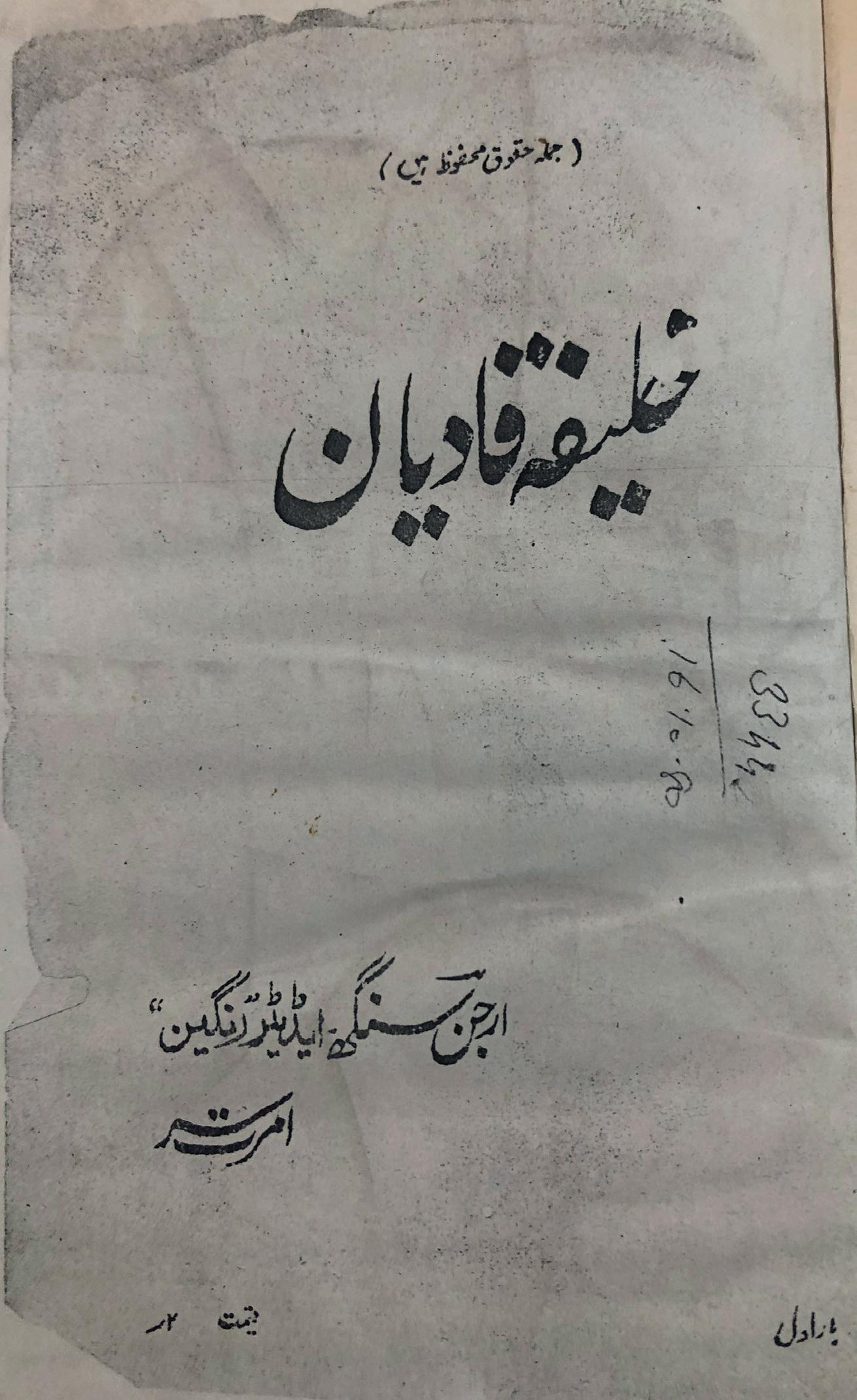
“Majlis-e-Ahrar, which claims to be unique in the world, has set aside all its previous principles just to engage in antagonistic activities against Ahmadis. Today, they desire to expel Ahmadi Muslims from Islam, and perhaps tomorrow, they will try to banish them from their homeland and subsequently from the rest of the world. However, we firmly believe that if there is any living group among Muslims, it is the Ahmadiyya Jamaat. As we have established before, the organisation and way of life of Ahmadis ensure their protection and safety.”
(Ibid., p. 29)
He adds,
“Furthermore, according
to the study of Ahmadi newspapers, it becomes evident that ever since the Ahrar party intensified their campaign against Ahmadiyyat, the Ahmadi Community has been progressing day by day. As a result, their financial condition has improved significantly. Their administrative departments are currently working with increased efficiency, and there is hardly any idle time. Meanwhile, 10 to 15 individuals from among the Muslims are joining the Ahmadiyya Community on a regular basis.
“We have learned from some responsible Ahmadis that they consider the Ahrar Movement [due to their opposition] highly beneficial for the progress of their Community. They claim that the Ahrar’s efforts against Ahmadiyyat will never be successful, and instead, the Ahmadiyya Community will flourish. The Ahmadis believe that every time the Ahrar tries to suppress them, it only strengthens the Ahmadiyya Community and inflicts distress upon the Ahrar themselves. The Ahmadis are confident that their Community will emerge triumphant in such circumstances.’’
(Ibid., p. 30)
Arjan Singh Ajiz has written in his book about the differences in beliefs between Ahmadis and other Muslim sects. In this section, he briefly discusses the beliefs regarding God, angels, divine scriptures, belief in prophets, belief in the Day of Judgement, and the demise of Jesusas. He also touches upon the concepts of the finality of prophethood, the second advent of the Messiah, and the perspective of Jihad.
The purpose of including this material in the book is to present a comprehensive view of the Ahmadis’ beliefs to non-Muslims. Through this concise booklet, one can gain insight into the layout of the Ahmadiyya Markaz in Qadian and appreciate the beautiful analysis of the lives of Ahmadis.
Foundation of new mosque laid in Cardiff
Ahmad Missionary, UK
On 9 September 2023, Jamaat-eAhmadiyya Cardiff laid the foundation stone of the Baitur Raheem Mosque – the first mosque in the Southwest region of the UK. The amila of Jamaat-e-Ahmadiyya UK and members of Majlis Ansarullah UK were also present.
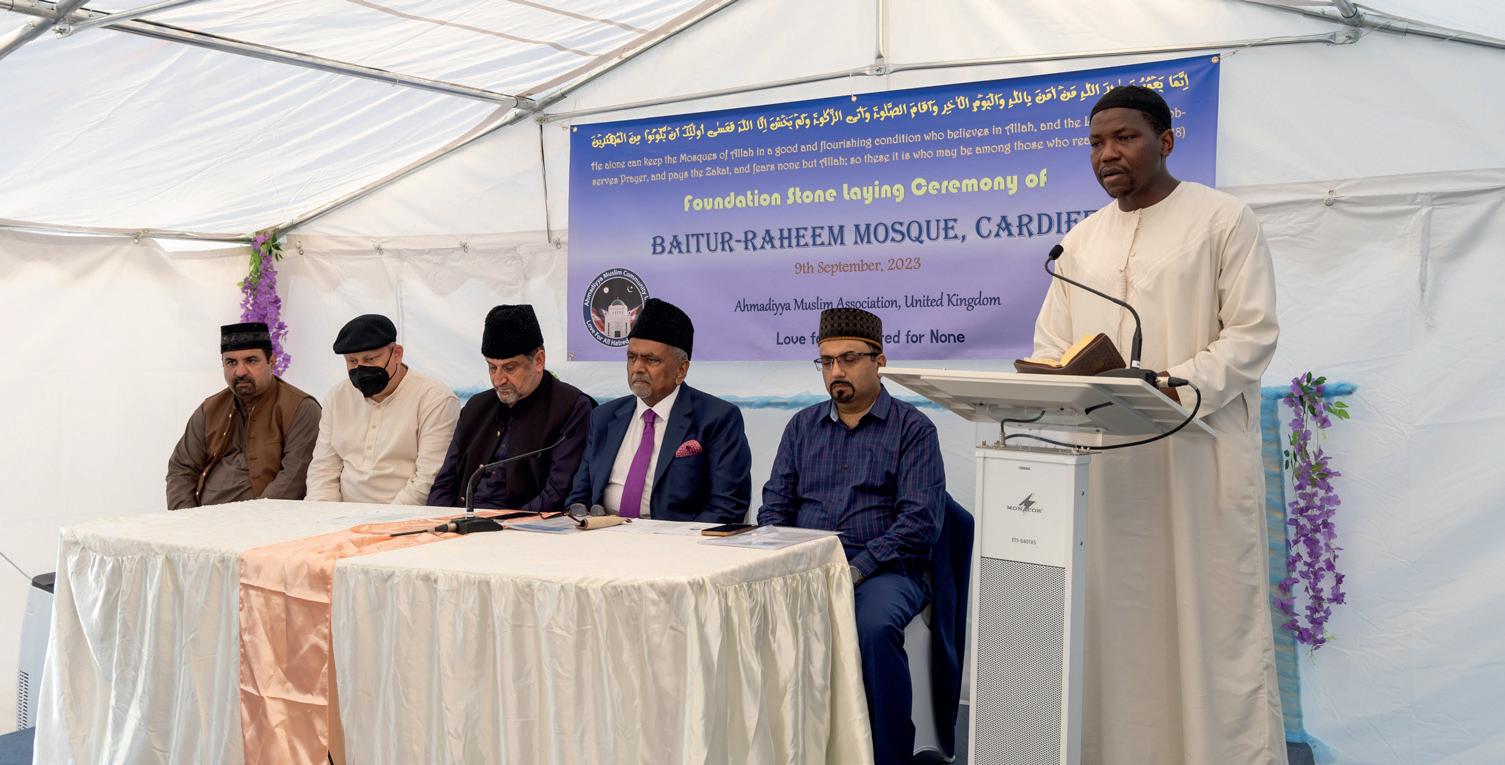
The ceremony began around 6 pm with the recitation from the Holy Quran. Following that, the history of the local jamaat was presented by Muhammad Noman Sahib, regional amir Southwest. Sadr Majlis Ansarullah UK Dr Ijaz ur
Rehman Sahib then spoke on the history of buying the land and the contribution made by the ansar brothers towards this mosque. Amir Jamaat-e-Ahmadiyya UK, Rafiq Hayat Sahib, thereafter spoke about the grace and mercy of Allah and also encouraged members to donate more towards the construction of this mosque. He presented faith-inspiring incidents of financial sacrifice.
22 Ahmadis had the opportunity to lay bricks, along with one of our non-Muslim architects, who had designed the whole plan for the mosque. The ceremony was concluded with silent prayer followed by food, and Maghrib and Isha prayers.
15 AL HAKAM | Friday 22 September 2023
Ammar
Image courtesy of AMJ UK
Khalifa-e-Qadian (Khalifa of Qadian)
100 Years Ago...
“One of our great objectives is to eradicate division and disunity from the world”: Telegram to Muslim leaders by Hazrat Khalifatul Masih II
Al Fazl, 21 September 1923
On 16 September 1923, the Qadian-based department working on curbing [Malkana Rajput] Apostasy Movement held a majlis-eshura [consultation] to consider the situation with regard to apostasy. After this [meeting], the following telegram was sent to the Muslim leaders and the press regarding the agreement that is being contemplated by the Hindu and Muslim leaders in Delhi about the Shuddhi Movement. The [telegram was sent to] Hakeem Ajmal Khan Sahib, Dr Ansari Sahib, Maulvi Muhammad Ali Sahib, and Dr [Saifuddin] Kitchlew Sahib in Delhi and also given to the newspapers [for publishing]:
“We [Ahmadiyya Muslim Jamaat] have come to know that an agreement is being finalised with Mahasha Shraddhanand that the Aryas who have come from outside places should leave the work of Shuddhi [converting Malkana Muslims to Hinduism] and the Muslims who have come from other places should also go back [from Agra], and the people of the area under discussion should be allowed to decide for themselves.
“In our view, agreeing on it is completely unwise and against the interests of Muslims. The people of Arya have been working there for a long time and converted thousands of men to their faith. Withdrawal at this time would simply mean that those people remain as Aryas, [completely ignoring the fact that they were compelled to leave Islam]. There is no harm for this nation [of Arya] to stop their endeavours now because they have already compelled [many to their faith]. The actual loss is for those who have
to bring the people of their faith back [to Islam].

“No Muslim can tolerate that their brothers in faith are compelled to convert. They cannot keep sitting silently and do nothing to help their fellowmen believe [in Islam]. The workers of the Arya faith are still present in that area. They have nothing to lose, but the real loss is for Muslims as their fellow believers do not have the ability or enthusiasm to work in their region.
“We do not understand why tabligh [preaching of one’s faith] would cause any strife in both nations unless a particular nation itself foments discord.
“Thus, we strongly protest against this agreement. We will not rest until the people of this area return to their [desired religion
of] Islam. We will not consider making any compromise on the honour of Islam. Our Jamaat hopes that you [i.e., Muslim leaders], realising the responsibility ordained upon you by Islam at this time, will not allow any agreement that is against the spirit of spreading the message of Islam.”
On 17 September 1923, when the telegram consisting of the aforementioned message was dispatched, the following cable was sent to Hazrat Khalifatul Masih II[ra] from the Muslim leaders:
Statement of Hakeem Ajmal Khan, Maulvi Muhammad Ali, and Dr Ansari
“Delhi, 16 September 1923, 12:30 pm.
“To Hazrat Mirza Bashiruddin Mahmud Ahmad Sahib[ra], Qadian, Batala.
“We strongly request that on your behalf, please send a responsible representative who is familiar with your views and can be consulted to stop the strife arising due to the Shuddhi Movement.
“From Ajmal Khan, Muhammad Ali, [and] Ansari.”
Consultation
After receiving the above telegram, a special meeting of majlis-e-shura was held. On his behalf, Hazrat Khalifatul Masih II[ra] appointed Chaudhary Fateh Muhammad Khan[ra] MA (Head of Ahmadiyya Da‘wato-Tabligh Delegation), Chaudhary Zafrulla Khan[ra] BA (Barrister-at-Law), Maulvi Sheikh Abdul Rahman Misri and Sheikh Yaqub Ali[ra] (Editor Al Hakam) as his
representatives and gave them necessary instructions. Both the Chaudharys, [Chaudhary Fateh Muhammad(ra)] in Agra and [Chaudhary Zafrulla Khan(ra)] in Lahore, were informed by a telegram to join the delegation. The remaining two companions[ra] left for Delhi from Qadian on 17 September 1923 and Hazrat Khalifatul Masih gave them the following letter for the Muslim leaders:
Letter of Hazrat Khalifatul Masih II
“In the name of Allah, the Gracious, the Merciful
“Peace and blessings of Allah be upon the Holy Prophetsa
“To, Honourable Hakeem Sahib, Maulvi Sahib and Doctor Sahib, “assalamu alaikum wa rahmatullahi wa barakatuhu!
“We received your telegram. After your request, I am sending Chaudhary Fateh Muhammad Khan Sahib[ra] MA (Head of Ahmadiyya Da‘wat-o-Tabligh Delegation), Chaudhary Zafrulla Khan Sahib[ra] BA (Barrister-at-Law), Maulvi Sheikh Abdul Rahman Sahib Misri and Sheikh Yaqub Ali Sahib[ra] (Editor Al Hakam). As far as I have been able to understand the message of your telegram, I have given them all the instructions regarding the Shuddhi Movement. If any question arises [in your mind] and my representatives do not know my stance, they will enquire from me and inform you. I can assure you that our Jamaat is eager for not only Hindu-Muslim unity but worldwide unity as well. One of our great objectives is to eradicate division and disunity from the world. However, it is all the more important for us that the root cause of the disagreement be identified first and that means be provided by which permanent peace and harmony can be established. Consequently, it can bring about peace among all the nations of the world. On the other hand, it should not be that such peace is achieved that is not long-lasting or that would result in another conflict.
“I hope that you will also agree with us in this endeavour and do your best to achieve it.
“Mirza Mahmud Ahmad, “Imam Jamaat-e-Ahmadiyya [1923].”
(Translated by Al Hakam from the original Urdu, published in the 21 September 1923 issue of Al Fazl)
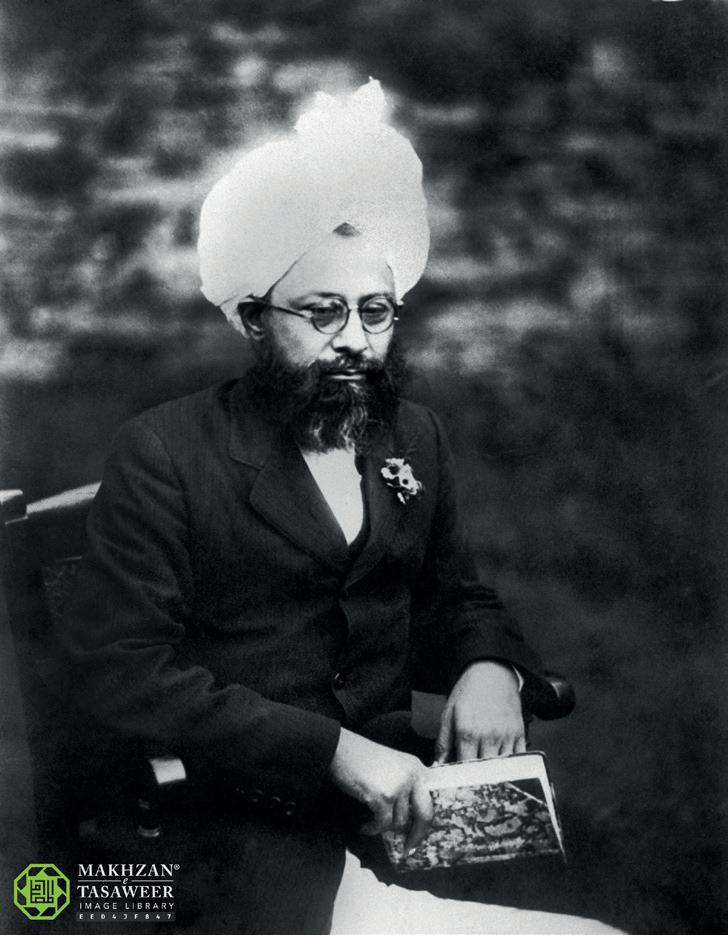
Friday 22 September 2023 | AL HAKAM 16
Friday Sermon
Mubarak Mosque, Islamabad, Tilford, UK
25 August 2023
Istighfar and Taubah
After reciting the tashahhud, ta‘awwuz and Surah al-Fatihah, Hazrat Khalifatul Masih Vaa stated:
Allah the Almighty accepts the istighfar [seeking forgiveness] and repentance of His servant, provided that it is true repentance and not just mere words. Allah the Almighty has mentioned on various occasions in the Holy Quran that He bestows those who truly repent with wealth and children and that it is a means of protection from divine punishment (Surah Nuh, Ch.71: V.13). One who seeks forgiveness, draws the mercy of Allah the Almighty. In one place, Allah the Almighty has given glad tidings to those who seek forgiveness and said:
امیحر اباوت ہللا اودجول
“[…] they would have surely found Allah Oft-Returning with compassion, and Merciful.” (Surah an-Nisa, Ch.4: V.65)
However, the condition remains that one should truly seek forgiveness and repentance. In a Hadith, it is related by Hazrat Anasra that he heard the Holy Prophetsa say the following: “The one who truly repents from sin is like one who has never committed any sin in the first place.” When Allah the Almighty loves a person, no sin can cause him any harm. That is, the factors that incite one to sin cannot lead him towards an ill deed, and Allah the Almighty protects such a person from the consequences of that ill-deed as well. Following this, the Holy Prophetsa recited the following verse: نیرہطتملا بحیو نیباوتلا بحی ہللا نا
“Allah loves those who turn to Him and loves those who keep themselves clean.”
(Surah al-Baqarah, Ch.2: V.223)
Upon this, someone said: “O Messengersa of Allah! What is the sign of [true] repentance?” How can someone know that they have truly repented? The Holy Prophetsa replied: “Remorse and regret are signs of true repentance.” (Kanz al-Ummal, Vol. 4, p. 261, Kitab at-tawbah, Hadith 10428, Mu’athitha al-Risalah, Beirut 1985)
Hence, those who truly repent not only purify themselves from sin by displaying true remorse and regret, but they also attain the love of Allah the Almighty and continuously partake of the mercy of Allah the Almighty. The Promised Messiahas has mentioned the conditions of true repentance on one occasion and said that the first condition is to rid oneself of evil thoughts and ideas. That is, one should completely rid oneself of thoughts that arise from unlawful desires. This requires a great Jihad [struggle] that a person has to undertake, as only then will they be able to move towards repentance. The second condition is to express true remorse and regret. One should reflect on the fact that these desires and worldly pleasures are temporary. They decrease by the day, along with the age of a person. Why should one then remain attached to them? Hence, fortunate is the one, who understands this reality and repents. Moreover, one should also express true remorse, as this was mentioned by the Holy Prophetsa. The third condition is to make a firm resolve to not go anywhere near such vices again. One should not stop there with the mere thought that they have made an oath to not go near sins and that this is sufficient. Rather, this should be replaced with good morals and virtuous deeds. (Taken from Malfuzat [1984], Vol. 1, pp. 138-139)
This is true repentance, this is true remorse, and after acquiring this state, Allah the Almighty bestows His love upon such a servant.
The Promised Messiahas has repeatedly drawn our attention towards seeking forgiveness and repentance. People make mistakes, and when these mistakes are made repeatedly, they lead a person from one sin to another.
Therefore, one should continue to seek forgiveness from Allah the Almighty while prostrating before Him. We should strive to purify our hearts and always remain mindful of not allowing ourselves to fail
in discharging our rights due to Allah and His creation. As I mentioned, the Promised Messiahas repeatedly drew the attention of his community towards seeking forgiveness and repentance. The Promised Messiahas was so concerned about this that he did not allow any opportunity to pass to draw the attention of the Jamaat towards this. The Promised Messiahas time and again drew attention to this in his various gatherings and in his writings. Thus, it is vitally important for us to always try and be mindful of and act upon the instructions of the Promised Messiahas which are in light of the commandments of Allah the Almighty and His Messengersa, so that we also become those who truly fulfil the due rights of our pledge of allegiance. If we fail to bring about a pure change in ourselves and do not pay attention to true repentance and forgiveness, then our pledge to reform ourselves is of no benefit. The Promised Messiahas has explained the concept of repentance in various instances and I shall present some of his extracts. Whilst expounding upon the benefit of seeking forgiveness, the Promised Messiahas states:
And that you seek forgiveness of your Lord, and then turn to Him. (Surah Hud, Ch.11: V.4)
“Bear in mind that two things have been granted to this ummah: one that grants strength and the other which enables one to practically demonstrate the strength that they have attained. In order to build strength there is istighfar (seeking forgiveness from God), which may also be described as istimdad (seeking support) or isti‘anat (seeking assistance). The Sufis have written that just as lifting meels [clubs] and weights increase the strength and power of the body, (i.e., those who do weightlifting, or lift dumbbells and various other exercises and just as they increase their physical
strength by doing so), similarly seeking forgiveness from God is a spiritual weight, which strengthens the soul and develops steadfastness in the heart. One who desires to develop strength ought to seek forgiveness [istighfar]. (If one wants to attain spiritual strength, then one ought to seek forgiveness.) The word ‘ghafrun’ means to cover or suppress, and so, through istighfar a person seeks to cover and suppress those emotions and thoughts that stand between them and God. Therefore, the purpose in seeking forgiveness from God is so that man may overcome the venomous agents that attack him and seek to destroy him, and so that he may steer clear of the obstructions on the path of fulfilling the commandments of God Almighty, and so that he may act upon them in the practical sense. It ought to be remembered also that Allah the Exalted has created man possessing two internal substances; one being a venom which is stimulated by Satan, and secondly, an antidote that lies within. When a person becomes arrogant and grows conceited, and when he does not seek support from the elixir that is housed within, a person’s infectious elements begin to dominate. However, when a person considers themselves to be lowly and insignificant, and feels an inner dependence on the support of Allah Almighty, a flowing spring takes form through the hand of Allah Almighty, by which a person’s soul melts and begins to flow forth. This is the very meaning of istighfar (seeking forgiveness from God), or, in other words, to gain this strength and overcome the poison that lies within (this is what it truly means to seek forgiveness). Therefore, what this means is that one should remain firm in worship by firstly, obeying the Messengersa and secondly, by seeking constantly assistance from God. Of course, initially, one must seek assistance from the Lord, but when one receives strength, one must then turn to God.” (Malfuzat [English], Vol. 2, pp. 241-
17 AL HAKAM | Friday 22 September 2023
ہیلا اوبوت مث مکبر اورفغتسا نا
In order to attain the help of Allah the Almighty one has to supplicate to Him.
The Promised Messiahas further states:
“It is plainly obvious that the nature of man is extremely weak and God Almighty has placed the burden of hundreds of commandments upon him. (Man is weak, yet Allah the Almighty has placed many commandments upon him). Hence, it is intrinsic to his nature that, owing to his weakness, he may fail to fulfil some of the commandments (it is natural that one may not be able to fulfil all the commandments as there are so many). At times, one is overcome by the nafs-e-ammarah [the self that incites to evil], thus, upon seeking forgiveness, it is his right that God’s mercy save him from ruin upon momentary lapses (since man is weak, therefore he possesses the right that Allah the Almighty accept his true repentance and save him). Thus, it is an established fact that if God did not accept one’s repentance then He would never have placed upon him the burden of countless commandments. From this, it is undoubtedly proven that God is OftReturning with Compassion and Most Forgiving. Taubah (Repentance) means that a person should discard a vice with the resolve that thereafter, even if he is thrown into the fire, he would not commit that vice (this is the kind of repentance that one ought to seek). When man turns towards God Almighty with such sincerity and firm resolve, then God, Who is Benevolent and Merciful, forgives him that particular sin. It is one of the high Divine attributes that God accepts repentance and saves a sinner from ruin.
“If man had not the hope of his repentance being accepted, he would not be able to refrain from sinning. If one has no hope of their repentance being accepted, then they will continue committing sins. There are many people who ask questions regarding this, that what is the benefit [of repentance] when this is going to be one’s ultimate fate? However, this is not the case. If one repents prior to this, then Allah the Almighty can save a person from it. The Promised Messiahas states, “The Christians also believe in repentance, but on condition that the person who repents should be a Christian. Islam lays down no condition for repentance. The repentance of the followers of every faith can be accepted leaving out only the sin of denying the Book of God and His Messenger. It is impossible that a person should attain salvation only through his conduct. It is the Benevolence of God that He accepts the repentance of some and bestows by His grace such powers on others that they are safeguarded against sinning.” (Chashma-e-Ma’rifat, Ruhani Khazain, Vol. 23, pp. 189-190)
Once, a person attended a gathering of the Promised Messiahas and asked what invocation he should recite. The Promised Messiahas stated:
“You ought to recite the prayer for God’s forgiveness. There are only two states of man; either that he does not sin or that Allah Almighty saves him from the bad outcome of that sin. Hence, when a person invokes the forgiveness of God, they ought to keep both of these concepts in mind (that is to not commit sin in the first place and secondly to prevent the bad outcome of the sins already committed and that Allah the
Almighty bestows His forgiveness and that he never commits such a sin in the future. Thus, one ought to be mindful of this whilst seeking forgiveness). Firstly, one ought to beg God Almighty so that He covers and hides one’s past sins and secondly, one ought to seek from God the ability so that one may be saved from committing sin in the future. However, seeking forgiveness through a mere verbal recitation will not suffice; rather, one should seek forgiveness from their heart. One ought to supplicate in the Prayer in their own tongue as well; this too is necessary. (Malfuzat [English], Vol. 3, pp. 235-236).
To simply utter istighfar or to write down “I seek forgiveness from Allah” and claim to not commit sin ever again is of no benefit. In fact, one has to prove that they shall never commit those sins again that they previously committed.
Whilst explaining the meaning of istighfar [seeking forgiveness], the Promised Messiahas stated on one occasion:
“Istighfar means for one to neither commit an actual sin, nor for the ability to commit a sin to emerge. The reality of the istighfar of the prophets is that they are free from sin, yet they perform istighfar so that even the ability [to sin] not be manifested in the future. However, for the general population, the other meanings of istighfar will also be taken into account for them, which is for God to safeguard them from the ill effects of the sins and evils they have committed, to forgive them for their sins, and at the same time, to protect them from future sins.”
The Promised Messiahas then further states, “In any case, it is incumbent upon man to always remain occupied in performing Istighfar. The tribulations manifesting in the form of droughts or in any other form are there so that people occupy themselves in istighfar.”
Nowadays, wars are taking place around the world. In such circumstances, we Ahmadis should profusely seek forgiveness, in order to save the world and to save ourselves. The Promised Messiahas then states, “However, istighfar does not mean for one to merely utter ‘Astaghfirullah, Astaghfirullah [I seek forgiveness from Allah, I seek forgiveness from Allah]. The truth is that its true meaning has remained hidden from the people due to being in a foreign language. The Arabs understood this well, however, many truths remained hidden from the people of our country due to it being in a foreign tongue. Many people claim they performed istighfar so many times, and recited tasbih [glorification of God] 100 times or 1,000 times, yet when they are questioned as to what the essence and meaning of istighfar is, they have no answer and are speechless. One must truly seek forgiveness from the depths of their heart so that they do not face retribution for the sins and vices they have committed. Furthermore, in the future, they should seek God Almighty’s help at all times from the depths of their heart, so that they are enabled to carry out good deeds, and are safeguarded from sins.”
The Promised Messiahas states, “Remember full well that nothing can be attained from mere lip service. It is also possible to seek forgiveness in one’s own language, so that Allah grants forgiveness for one’s previous sins and to be safeguarded
from future sins, and to be given the ability to do good – this is true istighfar There is no need to go about merely saying ‘astaghfirullah, astaghfirullah’, while one’s heart is completely oblivious to it. Bear in mind that only the word that emanates from the heart reaches Allah. One should, therefore, also supplicate to God Almighty in their own language as it has an effect on the heart. The tongue bears testimony to what is in the heart. If there is a fervour in the heart, and this is accompanied by the tongue, then this is excellent, however, without the heart, mere words are worthless and futile. Indeed, the supplications of the heart are the true supplications. When a person continues to pray to God Almighty and seeks His forgiveness from the depths of their heart prior to a trial, then that trial is averted by the Merciful and Benevolent God. Conversely, He does not avert the trial if [one supplicates after] it has already befallen. Thus, one ought to continuously pray even before any trial befalls them, and seek forgiveness abundantly. In this way, God shall protect them at the time of the trial. Our Community ought to display something out of the ordinary. If a person pledges their allegiance [bai‘at] and fails to display something extraordinary, and their treatment of their wife remains the same as before, and they treat their family and children the same as before, then this is not good. What benefit is there to the oath of allegiance if, after taking it, one possesses the same bad manners and ill-treatment and they are in the same state as before?
One should display such an example after the pledge of allegiance that others, one’s relatives and neighbours — all speak up and say that this individual is no longer the same as he was before. This should be the result of true istighfar. Remember carefully that if you purify yourselves and carry out a deed, then you shall most certainly impact others. How great was the awe-inspiring aura of the Holy Prophetsa! Once, the disbelievers were worried that the Holy Prophetsa would pray against them, so all of the disbelievers gathered and requested him not to do so. A truthful person does indeed possess an aura. One must therefore purify oneself and then act for the sake of God. It is then that one will have an awe over others and influence them.” (Malfuzat [1984], Vol. 9, pp. 342374)
Then, on another occasion, the Promised Messiahas stated:
“To fear God Almighty and to be righteous is a magnificent feat. As a result of it, God shields [one] from thousands of calamities, and without this protection of God Almighty, no one can claim immunity from affliction, nor should anyone feel secure. Calamities descend without warning. What knowledge does anyone possess of what is to come when night falls?
It is recorded that once the Holy Prophet, may peace and blessings of Allah be upon him, stood up. He wept profusely and then, addressing the people, he said, O servants of Allah! Fear God. Misfortunes and trials cling to people like ants. There is no way to be safeguarded from them except by being engaged in istighfar and repentance with a sincere heart.”
The Promised Messiahas then further explains:
“The meaning of istighfar is to seek the protection of God Almighty from
one’s previous sins and the punishment of one’s offences, and to beg protection from committing sin in the future. Prophets would always engage in istighfar as did the common people as well. Some ignorant Christian priests have criticised the istighfar of the Holy Prophet, peace and blessings of Allah be upon him (the Promised Messiahas is responding to the allegation), and have written that his performing istighfar is proof – God forbid! – of the sinfulness of the Holy Prophet, peace and blessings of Allah be upon him. These uninformed people do not even understand that istighfar is a lofty quality [in one’s character]. Mankind, by nature, is created such that its natural tendency is to be feeble and frail. Prophets are aware of this inherent frailty and the weakness of human nature. For this reason, they pray that O my Allah, grant us such protection that those human weaknesses are not even capable of appearing. The [Arabic] word ghafar means ‘to cover’. The essential point is that the power that God wields is not possessed by any Prophet, wali [saint] or Messenger. No one can possibly claim that they can safeguard themselves from sin through their own capabilities. Therefore, Prophets also stand in need of God for the sake of protection. Wherefore, as a demonstration of his humble submission before God, the Holy Prophet, peace and blessings of Allah be upon him, also used to pray to God Almighty for His protection like the other Prophets [did]. This belief of those people (i.e., the Christians) that Jesusas did not engage in istighfar is false. This is their foolishness and ignorance, and they level a false allegation upon Jesusas. A study of the New Testament reveals that he repeatedly confessed to his weaknesses and even performed istighfar. What was meant by his cry ‘Eli, Eli lama sabachthani?’ Why did he not cry out ‘My Father, my Father!’? In Hebrew, God is called Ail The very meaning of this [verse] is ‘Have mercy and help me and do not leave me abandoned like this (in other words, Protect me).’ In reality, the difficulty is that the true meaning and purpose of istighfar is lost in India due to the burden of a difference in language. These prayers are considered as though they are magical words, whether it be Salat [obligatory Prayers], istighfar, or repentance. If you advise someone to do istighfar, they reply that they recite istighfar one or two hundred times on a rosary, but if you ask them its meaning, they know absolutely nothing. Istighfar is an Arabic term that means seeking forgiveness, that O my God, protect me from the consequences of previous sins – as sin is a poison that has an inevitable effect – and grant me such protection in the future that I will not commit sin. Mere verbal repetition of the words will not serve the purpose.
“Taubah means to turn away from sin through repentance and remorse. There is no harm in it. On the contrary, it is written that Allah immensely loves the servant who repents. In addition, a name of God Almighty is Tawwab, the meaning of which is that when a person repents of his sins and becomes remorseful, vowing to avoid them in the future, then God Almighty turns to him with mercy. God turns to man more than the repentance of man, as it is reported in the noble hadith that if a person advances towards God by a distance of a portion of his hand, then God advances towards him by a
Friday 22 September 2023 | AL HAKAM 18 242)
measure of a full hand. If someone comes walking [towards Him], God Almighty comes running. Meaning that, if a person turns towards God, then Allah the Almighty also favours him with the utmost degree of mercy, grace, and forgiveness, but if he turns his face away from God, then what care should God Almighty have?” (Malfuzat [English], Vol. 10, pp. 431-434)
While explaining the true nature of Istighfar, the Promised Messiahas stated:
“One should know that the Holy Quran has presented two names of Allah Almighty – Al-Hayy and Al-Qayyum. The meaning of Al-Hayy is the God Who is Living and gives life to others. Al-Qayyum means the Self-Subsisting and the True Source of sustenance for others. The sustenance and life of all things, apparent and hidden, is through these two attributes. The word ‘Hayy’ requires that He be worshipped, as is manifested in Surah al-Fatihah in ‘Iyyaka Na’budu’ [Thee alone do we worship]. Similarly, ‘Al-Qayyum’ requires that support be sought from Him, and this is performed through the words ‘Iyyaka Nasta’in’ [Thee alone do we implore for help]. The word ‘Hayy’ necessitates worship because He created, and after creating, He did not simply leave it. For example, the demise of a mason (one who builds a building) after constructing a building does not cause any harm to the building itself. However, a person needs God Almighty at all times. For this reason, it is necessary that one continues to seek strength from God Almighty, and this is true istighfar [seeking forgiveness]. Then, expanding on this, it also applies to those people who sin, that they may be safeguarded from the evil results of these sins. (Even if one hasn’t sinned, one must still perform istighfar in order to remain alive and to remain in the refuge of God Almighty.) But the true [meaning] is that one is saved from human weaknesses. Hence, anyone, who is human, who deems istighfar to be unnecessary is an insolent atheist.” (Malfuzat [1984], Vol. 3, p. 217)
Then, while describing the true essence of istighfar, the Promised Messiahas states in one place:
“Sin is a disease which taints the blood, but it can only be cured by way of istighfar What is istighfar? It is [seeking] for God Almighty to protect against the ill effects of the sins committed and those not yet committed. Furthermore, it is for a person’s ability to commit sin to never be manifested, and for it to be burnt away to ashes from within. These are very fearful times, so occupy yourself in Taubah and Istighfar (the times we are passing through are of great fear. Occupy yourself in taubah and istighfar). Continue to assess your inner state. The people of every religion and nation, and the People of the Book, accept that punishments are averted through alms, but only prior to the manifestation of the punishments. Once the punishment has descended, then it is never averted. Therefore, seek forgiveness and occupy yourselves in Taubah from now on so that the trial does not befall you, and that Allah Almighty may protect you.”
(Malfuzat [1984], Vol. 5, p. 299)
Thus, in view of the current conditions of the world, we should profusely seek forgiveness as I mentioned earlier. May Allah the Almighty protect us from every kind of evil and trial.
Further expounding on the true reality
of repentance, the Promised Messiahas states:
“To reject repentance and forgiveness is to shut the door of human progress. It is obvious to everyone that man is not perfect in himself, but in fact, he stands in need of perfection. After his birth, he gradually expands his knowledge and is not born learned or well-informed. In the same way, when after his birth he begins to develop his senses, his moral condition is at a very low ebb. Observation of the condition of small children would show that most children are inclined to beat others on the slightest provocation and many of them are given to telling lies and using foul language with other children. Some steal and backbite and are envious and miserly. When they grow up, they fall into the grip of the self that incites to vice and are guilty of diverse types of evil and wickedness.
“Thus for most people the first stage of life is impure, (the society and conditions surrounding the person make them impure) but when a good-natured person emerges from the fierce flood of youth, he turns towards God (when a good-natured person observes the filth of this world then his attention is drawn towards God) and withdraws from undesirable activities through sincere repentance and occupies himself with purifying the fabric of his nature. These are stages of human life which people generally have to traverse. This shows that were it true that repentance is not accepted, it would mean that God did not even intend to grant anyone salvation.”
(Chashma-e-Ma’rifat, Ruhani Khazain Vol. 23, pp. 192-193)
On one occasion, when some people had come to take the pledge of allegiance and a gathering had formed, the Promised Messiahas advised them as follows:
“It is God Almighty’s desire that mankind performs true and sincere repentance and prays to become free from sin; and that he should neither be disgraced in the hereafter nor in this world.” One should repent in a manner that saves one from disgrace both in this world and in the hereafter. The Promised Messiahas further states: “Until a person is able to speak with true understanding of what he says and adopt humility, their words do not reach God. Sufis have written that if 40 days elapse and one has not cried for the sake of God, their heart becomes hardened. The only remedy for a hardened heart is to weep, and there are ways to induce such a condition. If one looks towards what they have accomplished and the condition of their life – if one takes a glance at the past – (the past holds many painful experiences as well) then one’s heart would begin to tremble and quiver. One who merely claims to be averse to sin is a liar. Where there is sweet syrup, ants will certainly come. Similarly, weaknesses naturally exist within the self; how can one be liberated from them? If God Almighty’s grace and mercy does not manifest, one cannot safeguard against sin. Prophets and saints do not take pride in the fact that they do not sin. Rather, they always seek the grace of God Almighty. This is exactly what is meant by prophets seeking forgiveness, so that God Almighty’s grace remains over them. Otherwise, if humankind is left to do as it wills, it cannot remain innocent and pure.
“[My Lord, create a distance between me and my sins.]
“There are other similar prayers that elucidate this very meaning of istighfar The secret to becoming servants [of God] is that one should come under God’s refuge, and one who does not seek God’s refuge is conceited and arrogant.” (Malfuzat [1984], Vol. 6, p. 21)
Someone once asked the Promised Messiahas how one can develop passion and derive pleasure in worship. Even now, people ask many questions in this regard. The Promised Messiahas said:
“Passion and pleasure in performing good deeds and worship cannot be produced by yourself; it can only be attained through God Almighty’s grace and if He enables you to. One should not become worried. Instead, one ought to continue to supplicate to God Almighty for His grace and strength (one should seek pleasure and passion in worship from Allah the Almighty). You should not tire of praying for this. When one is steadfast and resolute in his prayers, God Almighty showers His grace and fulfils the desires that once caused anxiousness and restlessness in their heart (if you are anxious and restless to develop passion and pleasure in your worship, and you remain steadfast in this, then ultimately you will achieve your goal). In other words, one begins to feel passion, pleasure and tastes the sweetness of worship. However, if one does not strive and struggle (if one does not make an effort at all) and thinks that this can be accomplished simply by blowing air, then this is not in accordance with the laws and practice of Allah the Almighty. If one tries Allah the Almighty in this way, he is mocking God Almighty and will be ruined. Remember well that your hearts are in the hands of Allah the Almighty. If it were not for His grace, you would become Christian the very next day or adopt another path of faithlessness. For this reason, constantly seek His grace and help through prayer that you may remain steadfast on the right path. He who becomes independent of God Almighty becomes akin to Satan. To avoid this, one must continue to seek forgiveness so that he is safeguarded against the poison and urges that seek to destroy him.”
(Malfuzat [1984], Vol. 8, pp. 154-155)
Thus, to attain a high standard of worship, one must seek forgiveness. Then, whilst elucidating on the secret to saving oneself from God Almighty’s punishment, the Promised Messiahas states:
“One should supplicate for repentance and forgiveness. Without repentance and forgiveness, one cannot achieve anything. All prophets have said that if one seeks repentance and forgiveness, only then will God forgive them. Offer your prayers and supplicate to God Almighty for help to avoid sins in the future. Seek forgiveness for past sins and repent over and over so that the potential that exists in human nature to commit sin is not manifested. There are two forces in the nature of humans; one is the strength to carry out good works and virtues, and the other is to commit evil. It is up to God Almighty to keep this [evil] force at bay. This force exists in humankind in the same manner that a stone holds the potential for fire.” (Malfuzat [1984], Vol. 9, p. 372)
The Promised Messiahas states:
And that you seek forgiveness of your Lord, and then turn to Him. (Surah Hud, Ch.11: V.4)
“Bear in mind that two things have been granted to this ummah: one which grants strength and for that, there is Istighfar [seeking forgiveness] and the other which enables one to practically demonstrate the strength that they have attained and that is to turn towards God through repentance. In order to build strength there is istighfar (seeking forgiveness from God), which may also be described as istimdad (seeking support) or isti’anat (seeking assistance). The Sufis have written that just as lifting meels [clubs] and weights (as it was mentioned earlier) increase the strength and power of the body, similarly seeking forgiveness from God is a spiritual weight, which strengthens the soul and develops steadfastness in the heart. One who desires to develop strength ought to seek forgiveness or perform istighfar.” (Malfuzat [English], Vol. 2, pp. 241-242)
The Promised Messiahas states:
“The door to God Almighty’s favours and grace is never closed. If a person inclines towards God with a true heart and sincerity, then the All-Forgiving and EverMerciful God will accept his repentance. To ponder as to whether God Almighty would ever forgive the sinners is utter insolence and disdain toward Him. The treasuries of His mercy are vast and infinite. There is no shortage in His court, and His door is not closed to anyone. His mercy is not like the jobs of the Englishmen that require extensive education. Those who strive towards God will attain lofty ranks accordingly, and this is a promise that is certain. One who despairs of God Almighty and dies in this state of ignorance is truly unfortunate and ill-fated. Surely, His door does close when death comes upon a person.” (Malfuzat [1984], Vol. 3, pp. 296-297)
However, in the end, when one dies, then there is no hope. The Promised Messiahas further states:
“In Arabic idiom, taubah (repentance) means ‘returning’, and that is why in the Holy Quran God’s name is also Tawwab, that is to say, He Who is Oft-Returning. This means that when a person discarding sin turns to God with a sincere heart, God Almighty turns even more to him. This is altogether in accord with the law of nature. God Almighty has made it part of human nature that when a person turns to another with a sincere heart, the latter’s heart is also softened for him. Then how can reason accept that when a servant turns towards God Almighty with a true heart God should not turn to him? Indeed God, Who is Benevolent and Merciful, turns even more towards His servant. That is why in the Holy Quran, God’s name, as we have just mentioned, is also Tawwab, meaning OftReturning.
“Man’s turning to God is through remorse and humility and meekness, and God’s turning to man is with mercy and forgiveness. If mercy were not one of the attributes of God Almighty, no one would be delivered. It is a pity that people do not ponder over the attributes of God Almighty and depend entirely upon their own actions. But can it be the attitude of God, Who without any action proceeding from man,
19 AL HAKAM | Friday 22 September 2023
یایاطخ نیب و ینیب دعاب مہللا
ہیلا اوبوت مث مکبر اورفغتسا نا
has created thousands of bounties for him upon the earth, that, when weak man, being warned of his heedlessness should turn to Him, a turning which is like death and should put off his old garment and should be consumed in the fire of His love, God should not turn to him with mercy? Is this the law of nature? Certainly not and may the curse of Allah be upon the liars.” (Chashmae-Ma’rifat, Ruhani Khazain, Vol. 23, pp. 133134)
Drawing our attention to bringing about a remarkable change within our lives, the Promised Messiahas stated:
“Bear well in mind that to depend on medicine and human strategies whilst putting aside God Almighty is extremely foolish. What is required is a completely new life; one full of seeking forgiveness from Allah. Those who are heavily engaged in worldly matters ought to be more fearful (those who, on account of being occupied in worldly affairs say that they do not find enough time [to offer prayers] should be fearful). Those in employment often fail to observe their obligations to God. On certain occasions, it is permissible to combine the Zuhr and Asr prayers, and also to combine the Maghrib and Isha prayers (if the circumstances are very dire then the prayers can be combined, otherwise the principle is to offer the prayers individually). I know that if the authorities are requested to grant leave for the obligatory Prayers, they are accommodating. Government officials are under instruction by their superiors to grant permission for the observance of Prayer. To neglect the Prayer by resorting to feeble excuses is nothing but a weakness of the self. Do not fail to offer the rights owed to God’s servants and the rights owed to God. Fulfil your obligations.” (Malfuzat [English], Vol. 1, p. 266)
Thus, seeking forgiveness and repentance will only be of benefit when one keeps their fundamental obligations in view and duly fulfils them. Prayers should be offered with consistency. One should also duly fulfil the rights of Allah and His creation.
The Promised Messiahas further states:
“Rise up, therefore, and repent, and appease your Lord with good deeds. Bear in mind that the errors of belief will only be punished after death, and the dispute between Hindus, Christians and Muslims will be decided in the Hereafter, but he who crosses all bounds in audacity and immorality will be punished in this world, and there is no way he can escape Divine chastisement. Try to please your Lord and remember that He is the Most Compassionate and forgives the sins of a whole lifetime in a moment of self-consuming repentance. Do not despair of His forgiveness. Remember, that you can only be saved by His grace and not through any of your efforts (thus, one should continue to remain ever inclined towards Allah the Almighty and seek His grace and forgiveness). O Merciful and Compassionate God, have mercy on us, for we are Thy servants and have thrown ourselves upon Thy threshold. Amen” (Lecture Lahore, pp. 35-36)
May Allah the Almighty enable us to become the recipients of the Promised Messiah’sas prayer and may we seek forgiveness and repentance whilst
understanding its true meaning and essence.
Now I will mention some deceased members and will later lead their funeral prayers [in absentia]. The first mention is of respected Ansa Begum, who was the daughter of Hazrat Mir Muhammad Ishaqra She recently passed away at the age of 93.
[Verily, to Allah we belong and to Him shall we return.]
By the grace of Allah the Almighty she was a Musia. She was born in Qadian. Hazrat Mir Nasir Nawabra was her paternal grandfather. Her mother’s name was Hazrat Saliha Begum, daughter of Pir Manzur Muhammad. She obtained her primary education in Qadian. Allah the Almighty blessed her with two sons and a daughter. She was married to the late Qazi Shaukat Sahib. Mir Mahmood Ahmad Nasir writes from Rabwah about his sister, “She was very simple, kind and innocent. Before getting married, our sister would take care of the entire family.” He says, “In the early days of Rabwah when there wouldn’t be any electricity, the heat would be extreme, and people lived in mud houses.” He says, “We would all stay in one room to avoid the heat as it had a ceiling fan which would be made to move with a rope. Without anyone asking, for the sake of our comfort, she would go out and push the rope so that we could sleep peacefully. She had a selfless passion for serving others.” Her children write, “Our mother was a very sincere Ahmadi Muslim. She fulfilled her rights and duties as a wife. She was very simple in nature and very loving. She would speak about the salient incidents full of wisdom from the lives of the Holy Prophetsa, his Khulafa and Companions in a very simple manner. She would also be able to easily relate incidents from the history of the Jamaat, the Promised Messiahas, his Khulafa and Companions. She would enjoin her children and generally others as well to remain steadfast in faith and to live an honourable life. She was very active in rendering service to the Jamaat. Her greatest quality was her compassion for humanity. She also had a great passion for propagation. [Whilst travelling,] she would go to the airport terminal and preach the message of Islam to everyone, including the pilots. Her morals were beautiful and there was a simplicity to them. She was very good at delivering speeches.” Her niece Amatul Kafi says, “Her formative training was so strong that she never veered away from the training of her parents. She had such a passion for service to the faith that she would regularly go to the mosque in New York to clean it. People say that until she was strong enough, whenever she went to the market she would propagate the message to people of all walks of life according to their understanding and in their language. She had great compassion and love in her heart for the needy and helpless. May Allah the Almighty enable her children to carry on the legacy of her virtues and grant her His forgiveness and mercy, and elevate her station.
The second funeral is of respected Bushra Akram from Sialkot. She also recently passed away.
[Verily, to Allah we belong and to Him shall we return.]
She was born in 1955 in Batal, Sialkot. Among her outstanding qualities were that she was virtuous, righteous, regular in offering prayers and fasting, and was very sincere. She was hospitable and tended to the poor. She had a special love for the Khilafat. She also respected life-devotees a great deal. She is survived by her husband, three daughters and a son. Her son Shahryar Babar Shahzad, is a missionary of the Community in Sierra Leone and due to being in the field of service there he was unable to attend the funeral.
Babar Shahzad, the missionary writes, “She was very happy when I was accepted into Jamia. She inquired what they had asked and I told her that they asked me in Jamia that since I am my parents’ only son, who would take care of them if I dedicated my life? I gave them my response, and when my mother heard it she said, ‘If I had seven sons I would have dedicated all of them.’” He says, “In her final days when she was in the hospital I called to ask how she was doing. Despite being in great discomfort, she said that she was fine and that she was eating and drinking as the doctor had prescribed. She also said that if anything happened to her I should not worry and that I should remain in Africa and should not make my children worry; I am a life-devotee and so I should remain patient.” He says, “These were my mother’s last words.” She took care of the poor and widows, and would render financial aid to them. Whenever the harvest of wheat or rice would come in she would divide it into various parts to assign their share. May Allah the Almighty grant her His forgiveness and mercy and grant her children patience.
The third mention is of Musarrat Jahan, wife of Chaudhry Muhammad Akhtar of Australia. She also recently passed away at the age of 87.
نوﻌجر ہیلا اناو ہلل انا [Verily, to Allah we belong and to Him shall we return.]
Her paternal grandfather Hazrat Babu Muhammad Afzal Aujalvira was a companion of the Promised Messiahas and she was raised in his presence. She had a brain haemorrhage and had been bedridden for the past 16 years. Her son Zahid and daughter-in-law especially took care of her. Her daughter-in-law says, “The way she treated me during her active life was not like a mother-in-law but as if I were her daughter. She was regular in offering prayers, keeping fasts and offering tahajjud. She would take special care of her worship. She had kept a separate place in her home for worship. When there would be a Dars [on the Holy Quran] in Masjid Mubarak she would walk from Darul Uloom to attend the Dars and she would also go in the last ten days [of Ramadan] for the Tarawih prayers. She had great love and respect for the Khilafat. Her husband was a stationmaster in the railway. Wherever he would be posted she would hold lessons for children to learn the Holy Quran in her home. When she settled in Rabwah she would also hold Quran classes there.” She is survived by her husband, three sons and three daughters. Her youngest son
Hafiz Rashid Javaid is a life-devotee serving as Nazim Darul Qaza in Rabwah. May Allah the Almighty grant her His forgiveness and mercy and enable her children to carry on her good deeds.
The fourth mention is of respected Nasir Ahmad Qureshi of the USA. He also recently passed away at the age of 88.
نوﻌجر ہیلا اناو ہلل انا
[Verily, to Allah we belong and to Him shall we return.]
He was married to Amatul Bari Nasir who served as the Secretary Ishaat for a long time under Lajna Imaillah Karachi. He is survived by his wife, two sons and three daughters. One of his grandsons, Waqas Khurshid is a missionary while another grandson is studying in Jamia Canada. His father was respected Muhammad Shamsuddin Bhagalpuri. Ahmadiyyat was established in their family in 1913 when respected Maulvi Abdul Majid, the father of Hazrat Sayyidah Sarah Begum, wife of the Second Khalifara held a gathering in that area and presented arguments in favour of the truthfulness of the Promised Messiahas His father was greatly influenced and went to meet him on the stage. He was given some literature which he read and subsequently developed a passion for Ahmadiyyat. He prayed and Allah the Almighty showed him the blessed countenance of the Promised Messiahas in a dream along with other blessed dreams. Hence, he wrote a letter to Hazrat Khalifatul Masih Ira), pledging allegiance to him. In this way, he was among the foremost Ahmadis in Bhagalpur. Due to extreme opposition, he migrated to Qadian along with his wife and children where he continued to increase in sincerity and love. He also had the opportunity to serve as the car driver for Hazrat Khalifatul Masih IIIrh Nasir Qureshi Sahib was born in Qadian. After the partition, he moved to Karachi where he obtained his education. He continued his studies with great effort and dedication, despite unfavourable conditions. He did his BA in electrical engineering and then took up a job in the Telephone Department and progressed to the rank of General Manager. When he retired, he did so with the reputation of being a hardworking and trustworthy leader. In the Jamaat-eAhmadiyya Karachi, he served as the local President of the Nazimabad chapter. He lived elsewhere as well and also served as the Local President there. May Allah the Almighty grant him His forgiveness and mercy.
His wife, Amatul Bari, writes, “I always found him to be regular in offering prayers and keeping fasts. His heart was attached to the mosque. He was a responsible husband and he took great care of the education and training of his children. He would also help those in need. He had a profound love for the Khilafat. He always spoke in a truthful and straightforward manner.” By the grace of God, he was a musi. May Allah the Almighty enable his children to carry on the legacy of his virtues.
(Official Urdu transcript published in the Daily Al Fazl International, 15 September 2023, pp. 2-7. Translated by The Review of Religions.)
Friday 22 September 2023 | AL HAKAM 20
Editor-in-chief: Qaasid Muin Ahmad | Executive editors: Ataul Fatir Tahir, Aqeel Ahmed Kang | Research coordinator: Awwab Saad Hayat | Associate editors: Jalees Ahmad, Ata-ul-Haye Nasir Translations: M Adam Ahmad | Design: Tahmeed Ahmad | © Al Hakam 2023
نوﻌجر ہیلا اناو ہلل انا
نوﻌجر ہیلا اناو ہلل انا













































































































































































































































































































